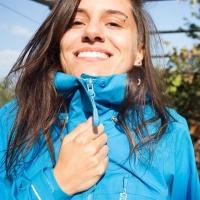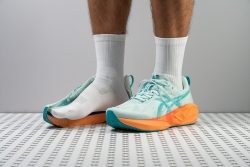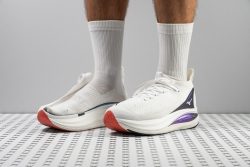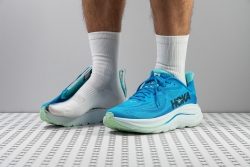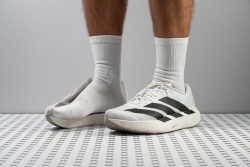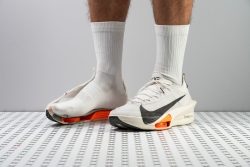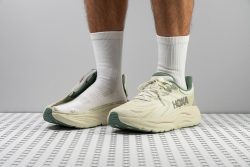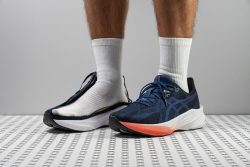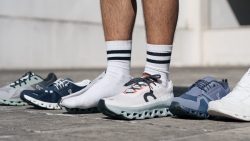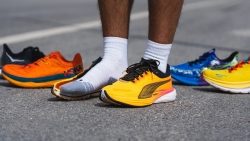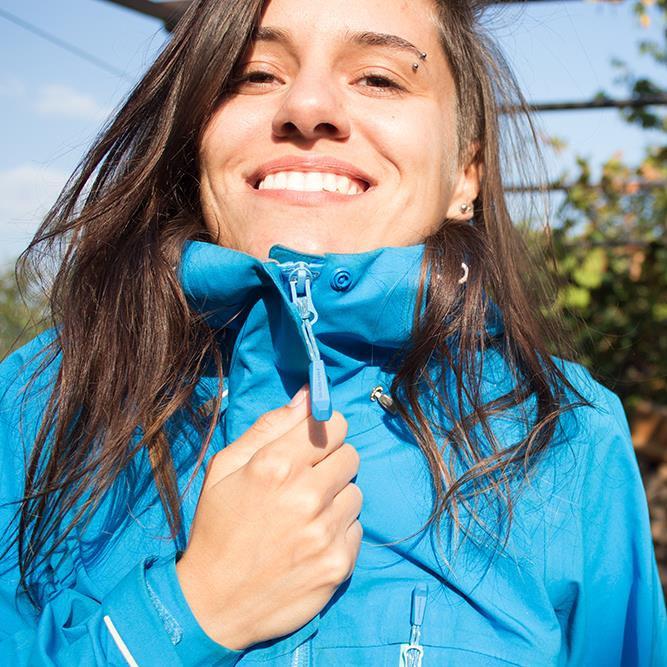7 Best Cushioned Running Shoes in 2026
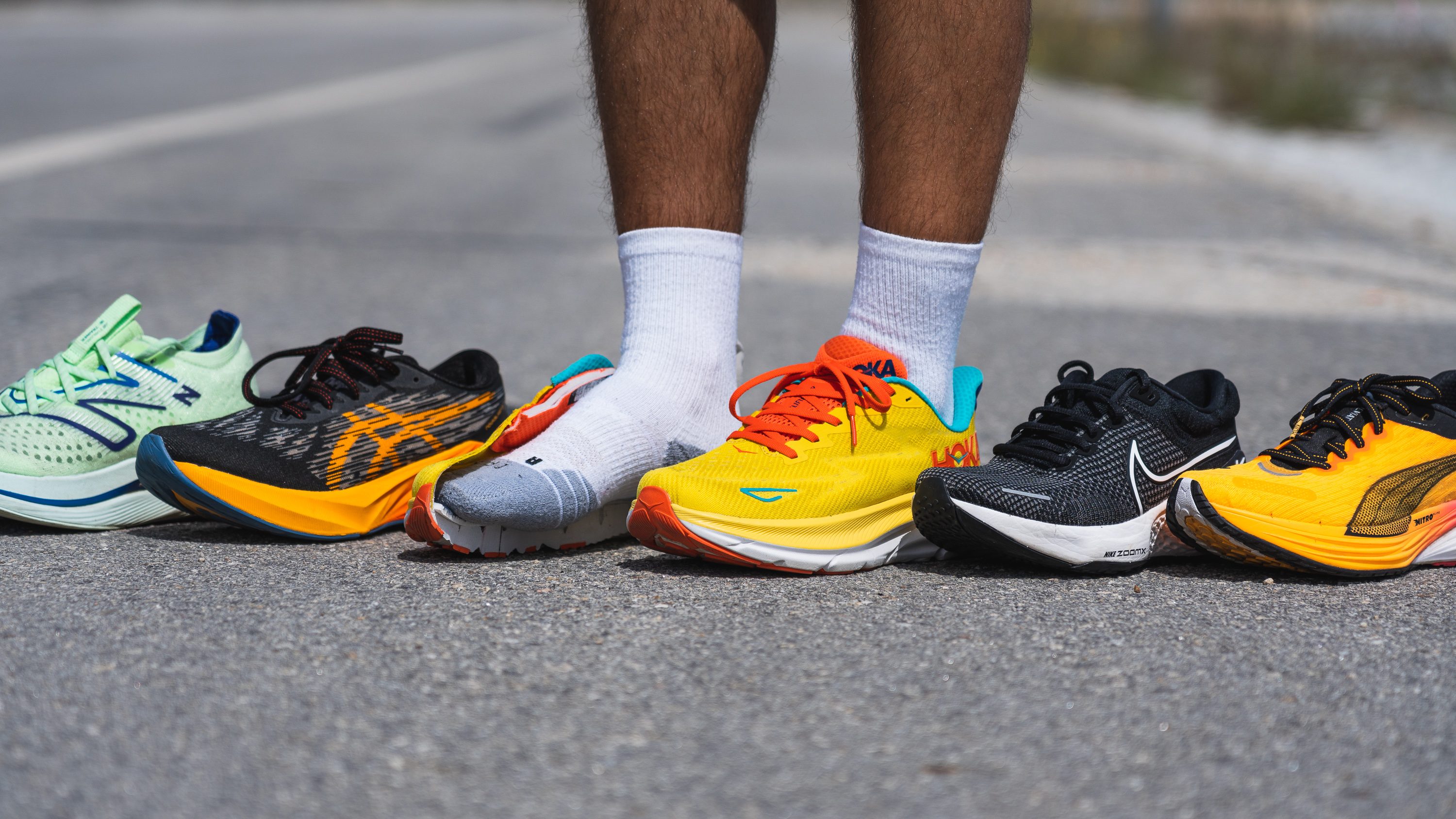
We buy shoes ourselves. We earn commissions when you buy through us, at no extra cost. Why trust us
Cushioning is what makes the shoes comfortable, soft, and bouncy. Some cushioning units help you feel nice and pampered on those slow recovery days. Others encourage you to speed up, feeling like small trampolines under your feet.
With our independent shoe lab and wear tests, we have reviewed many cushioned running shoes to select the best.
And if you’d like to learn more about which foams are more responsive and which ones are more durable, how a carbon plate affects their performance, and other cushioning details, we wrote an in-depth guide as well.
How we test cushioned running shoes
We know how to tell shoes with great cushioning apart from standard ones. Here is our approach:
- We, a team of dedicated runners, test each pair to provide extensive feedback.
- Inside our lab, we literally tear each shoe apart to measure over 20 different parameters. We measure the midsole's energy return to determine performance, test its shock absorption for impact protection and comfort, stick a durometer into the foam to determine its softness, and even put shoes in the freezer to check how their cushioning changes in cold temperatures.
- We purchase all running shoes with our own money to avoid brand loyalty and bias.
The best shoes get on this list.
Best cushioned running shoes overall
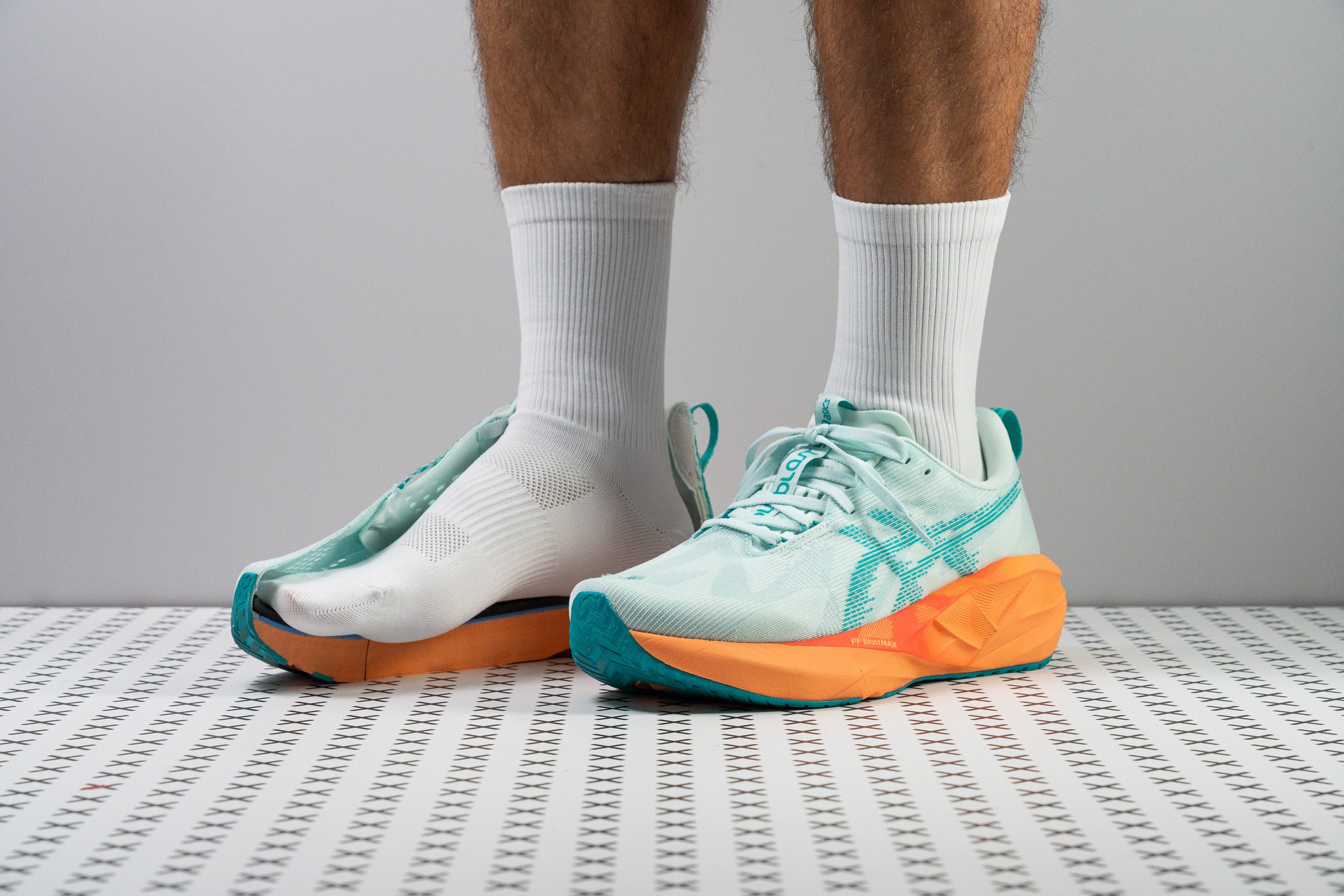






















































What makes it the best?
The fifth time’s a charm for Novablast as it’s a versatile trainer that helps us cruise comfortably at any pace. Backed up by lab results and runs, it balances stability, lightness, and a good amount of energy with an insanely plush platform—claiming its rightful place as the best-cushioned running shoe.
Sinking into the generous cushioning is pure bliss. Its FF Blast MAX foam has a heavenly combination of height and softness. Our calliper shows a massive 40.9/33.5 mm stack. No matter where we land, our foot is protected from ground impact. Our durometer shows it’s 17% plusher than average, making it propulsive and comfortable even for long runs.
Despite its skyscraper build, our runs feel supported and balanced. Its landing platform is wider than average, with an extra 8.3/6.9 mm to find our footing. We also gauged its torsional rigidity at 4/5, explaining why the shoe feels stable.
What’s amazing about the Novablast 5’s ride is its light feel despite its massive build. Our scales confirm this with a below-average reading of 9.0 oz (254g). Plus, we found it highly pliable, which adds to its effortlessness. Our bend test validates it’s 27% more flexible than the average.
However, while traction is great on dry surfaces, we didn’t feel confident enough on wet ones. Those who frequent slippery roads should find a shoe with a grippier outsole.
Pros
- Improved energy return with FF Blast MAX foam
- Plushiest foam in a Novablast yet
- Keeps the same price as v4
- Higher stack height for extra cushioning
- Enhanced flexibility
- Lighter than its predecessor
- Best Novablast ever for wide feet
- Exceptional weight-to-cushion balance
- Works for short, medium and long runs
Cons
- Breathability could be improved
- Toebox durability
- Toebox durability
Cushioned running shoes with the best shock absorption
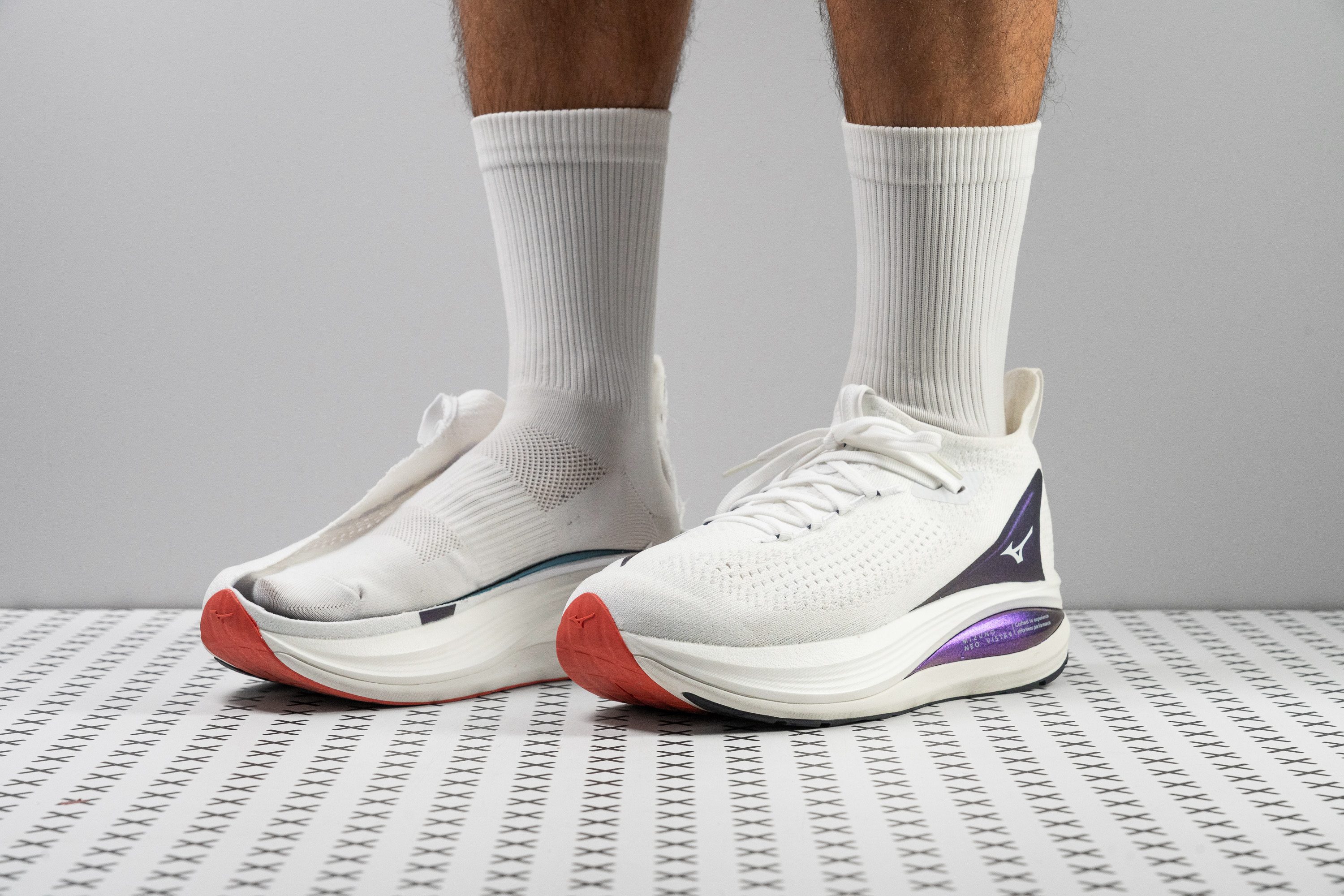
















































What makes it the best?
In the cushioning realm, we took our time finding the shoe with the best shock absorption, and we instantly knew the answer when we ran with the Mizuno Neo Vista 2. The comfort level we experienced was off the charts. Lab tests reveal its supreme flexibility and surprisingly light build, which harmonise seamlessly with an exceptionally protective midsole that feels ethereal.
With its monumental 46.0/37.5 mm stack height, exceeding the average by 11.2/11.4 mm, it offers unmatched impact protection regardless of footstrike. With its 170 SA (heel) and 137 SA (forefoot) scores in our shock absorption test, we truly confirmed that it puts less stress on our legs since it offers 31.8% and 29.2% better impact protection than average, respectively.
Despite maximum cushioning, it’s even lighter than the average running shoe at 9.3 oz (264g). This lightness, combined with its pliability, soothes our feet. Our bend test shows the midsole is 11.2% more flexible than average. Indeed, double-digit miles feel almost therapeutic.
With the luxurious comfort it brings, it reaches the £200 mark. Runners who don’t want to spend that much can find well-cushioned, cheaper alternatives.
Pros
- Massive stack height
- Super-plush Enerzy NXT foam
- Perfect for long runs
- Lightweight for its huge size
- Good durability
- Breathable knit upper
- Roomy toebox height
- Insanely fun!
Cons
- Not enough energy return
- Price hike feels unjustified
- Not stable for heel strikers
Best cushioned daily training running shoes
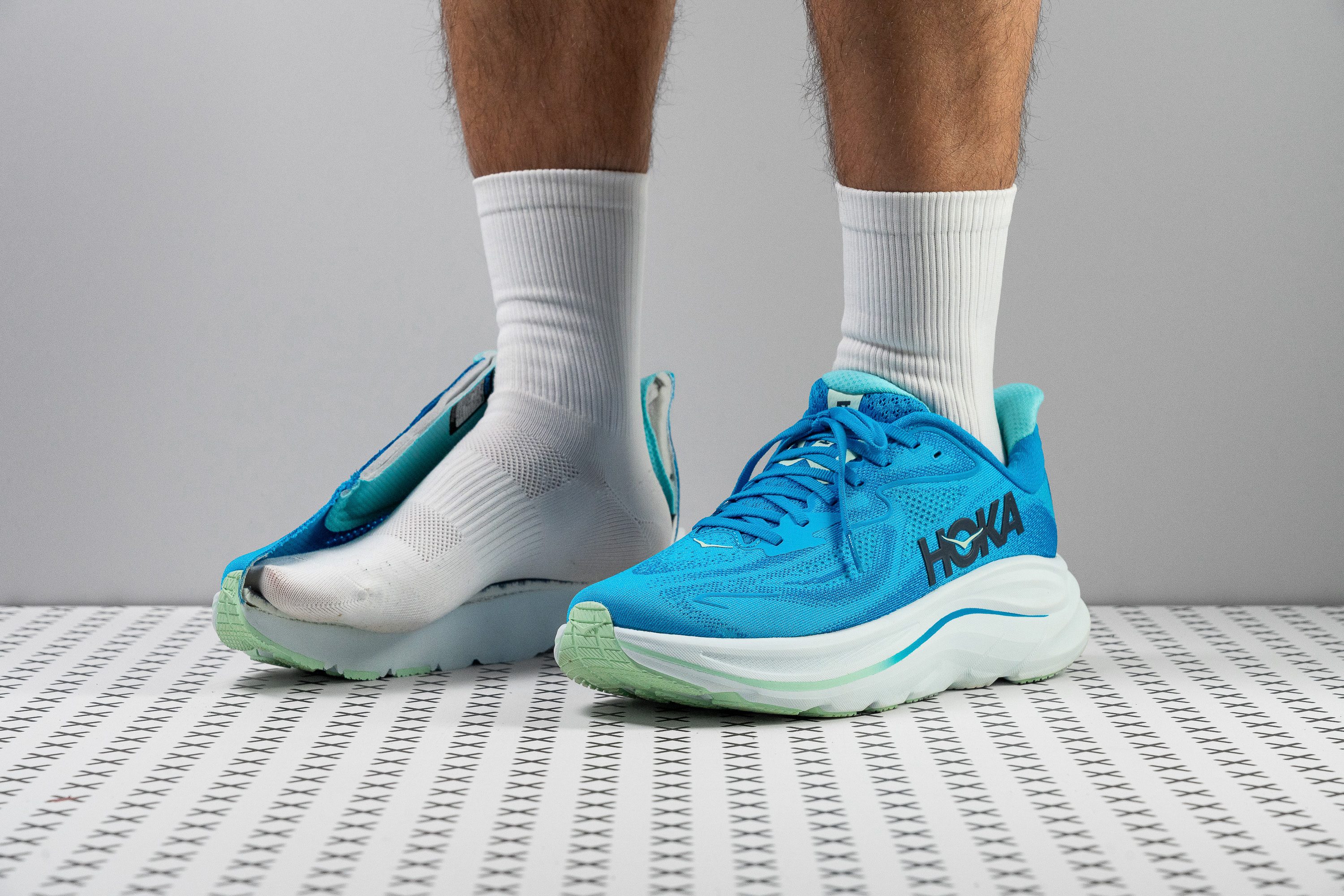




















































What makes it the best?
The Hoka Clifton 10 is a light, cushioned yet stable shoe that’s perfect for soaking up mileage, making it our top daily trainer. Our lab results validate it’s comfortable for any distance but shines the most on days we want to forget about speed.
The thick midsole feels plush and mutes out the ground feel underfoot. Our calliper reveals the stack offers maximum protection through its 44.4/32.0 mm heel and forefoot cushioning. Our durometer reading confirms its soft sensation at 34.2 AC, offering boundless comfort.
The fluid midsole smoothens transitions, requiring a middle-range amount of force to bend (14.7N). It gives a sense of agility because of its light build. We were surprised to see its 9.7 oz (275g) weight and how it managed to stay under the 10-oz mark!
In the lab, we measured the platform to be wider than average at 116.9/94.5 mm. This allows us to maintain our surefootedness despite the stack’s height, while the midsole sidewalls guide our foot alignment.
While the padded upper offers comfort and support, it lacks ventilation, making it less ideal for hot weather. We recommend this pair for cooler conditions or pairing it with thin socks in warmer environments.
Pros
- Superb joint protection
- Wider toebox improves toe splay
- Comfortable upper
- Stable ride despite its high stack height
- Works well for heel strikers
- Ideal for long runs
- Versatile for daily walking or jogging
- Achilles-friendly heel collar design
- Traction improvements
Cons
- Needs a better foam ASAP
- Notable weight gain from v9
- Feels more Bondi than Clifton
- Non-gusseted tongue
Best cushioned tempo running shoes
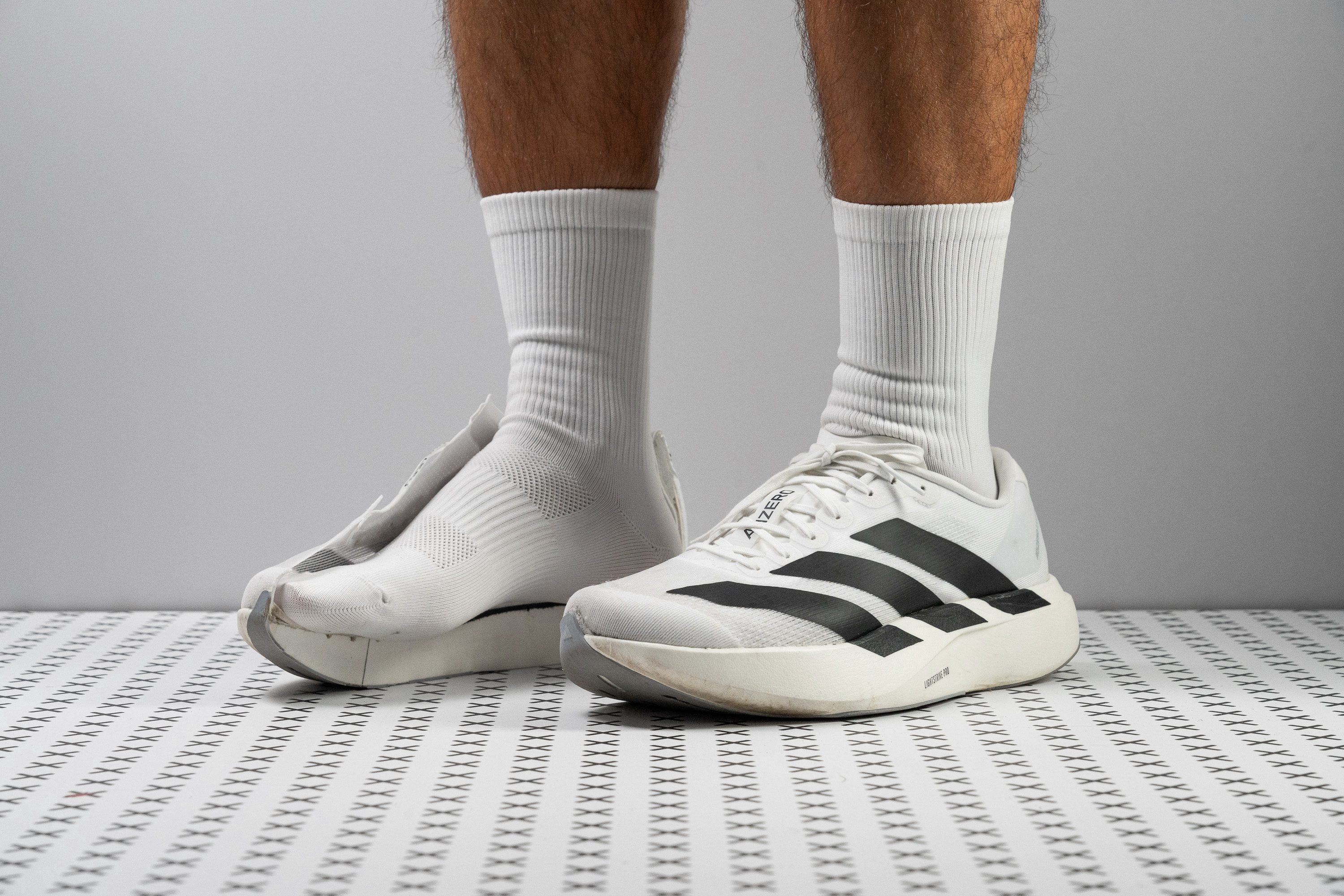
































































What makes it the best?
In the cushioning domain, the Adidas Adizero EVO SL is a standout for its speed and lightness, making it our best tempo cushioned running shoe. Lab tests reveal it features the Lightstrike Pro midsole, which explains its beautiful blend of shock absorption and propulsion. Running with this trainer easily takes the boredom away, creating an enjoyable experience with its smooth transitions.
Its responsiveness in our runs is undeniable, and we tested the midsole further in the lab. We recorded elite energy return scores of 74.3% in the heel and 70.3% in the forefoot, performing way above their respective averages of 58.5% and 60.8%.
The generous cushioning offers marathon-ready protection. We recorded a high stack of 36.1/28.1 mm, yet what truly makes it special is its ability to reduce the impact of landings. We recorded exceptional shock absorption scores of 147 SA in the heel and 126 SA in the forefoot, making this shoe extremely protective underfoot.
Despite its height, Adizero EVO SL remains light and natural on foot. Our scales show it’s only 7.9 oz (223g), 15.5% below average. Moreover, we found it very pliable in our flex test, emerging 36% more bendable than average.
Note that the toebox is vulnerable to damage, based on its disappointing result in our Dremel test. Runners who tend to puncture their shoes’ uppers should go for a more durable shoe.
Pros
- 100% Lightstrike Pro superfoam
- Exceptional value-to-performance ratio
- Low weight
- Ultra-breathable upper
- Unmatched versatility
- Agile and fun ride
- Handles short and long runs with ease
- Striking Evo 1-inspired aesthetics
- Striking Evo 1-inspired aesthetics
Cons
- Poor-quality laces
- Short, non-gusseted tongue
- Toebox durability
Best cushioned running shoes for race
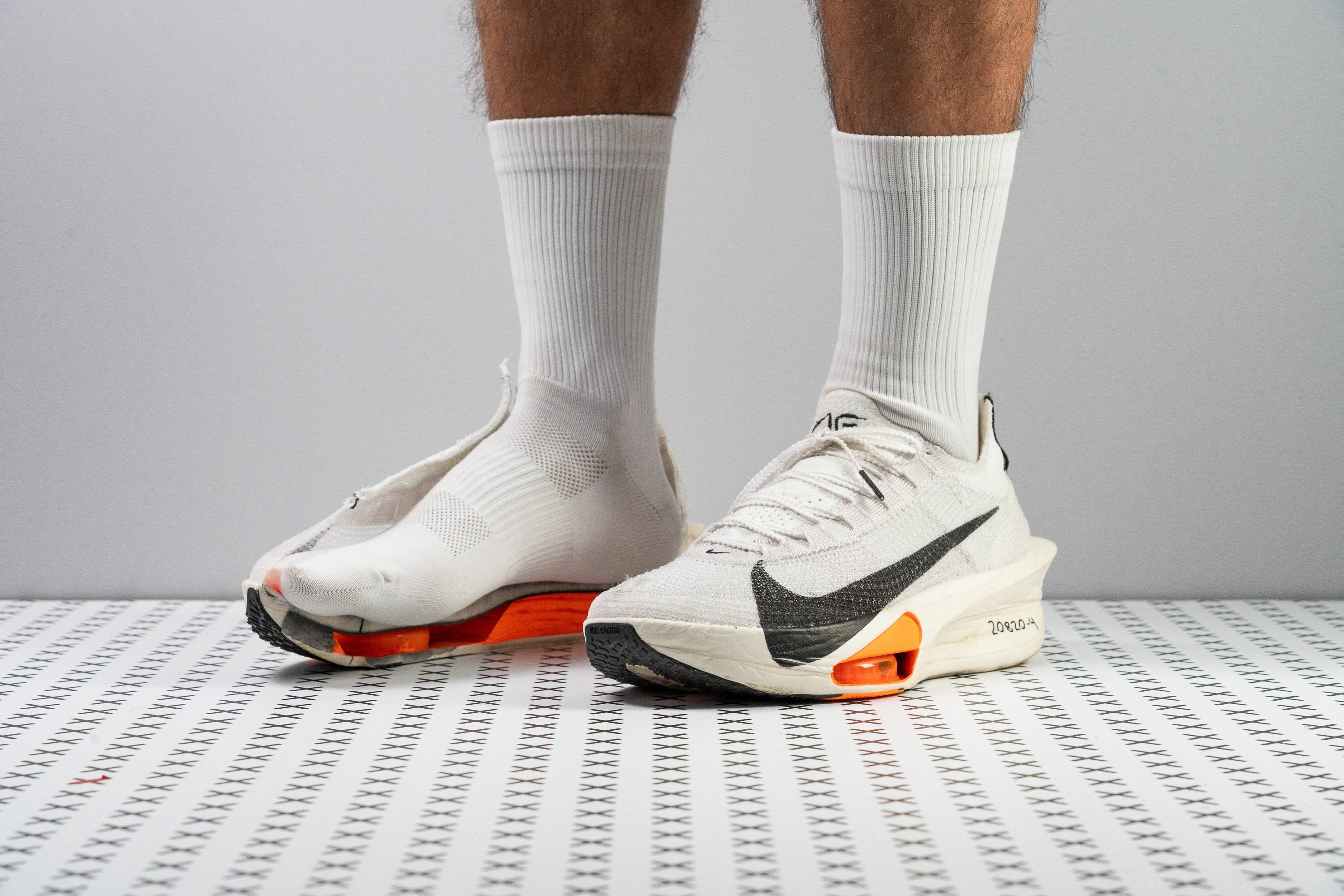













































































What makes it the best?
Nike’s Alphafly 3 is all about speed and maintaining that forward momentum. It’s a stellar combination of comfort, massive energy return, and airiness that allows us to fly through the miles without counting. Backed up by exceptional ratings from our lab and test runs, it’s our top racer among cushioned running shoes.
At its core is the innovative midsole design, featuring a rigid FlyPlate and Air Pods for maximum responsiveness. It ensures we stay energised even during gruelling long-distance runs. It delivers unwavering support and resilience, as proven by our bend test, which emerged 86% stiffer than average. This translates to insanely propulsive strides.
We measured an impressive 38.1/29.6 mm stack, made of the superior ZoomX foam, that protects us from leg fatigue while launching us forward. It has a dual-density set-up—a soft 34.5 AC for comfort and a firm 47.2 AC top layer for stability.
Despite its substantial height, it weighs a feathery 7.1 oz (201g), boosting our speed and agility. The well-ventilated Atomknit upper adds to its allure, providing exceptional breathability for better comfort. Our lab confirms this with a perfect rating for ventilation.
However, it's worth noting that this speedster comes with a hefty price tag of £280. Nonetheless, we believe it's worth the investment for runners aiming to achieve peak performance.
Pros
- Remarkably lightweight despite its broad size
- Best-in-class breathability
- Excels in the marathon distance
- Repositioned Air Pods offer a better ride than the v2
- ZoomX foam delivers massive energy return
- Aids in forward momentum, especially when legs begin to fatigue
- Better than ever for 5K/10K racing
- Finally smooth transitions!
Cons
- Heel strikers might wear down the outsole quickly
- The arch could still be a challenge for some
- The sock-like tongue might not suit everyone
Best stability cushioned running shoes
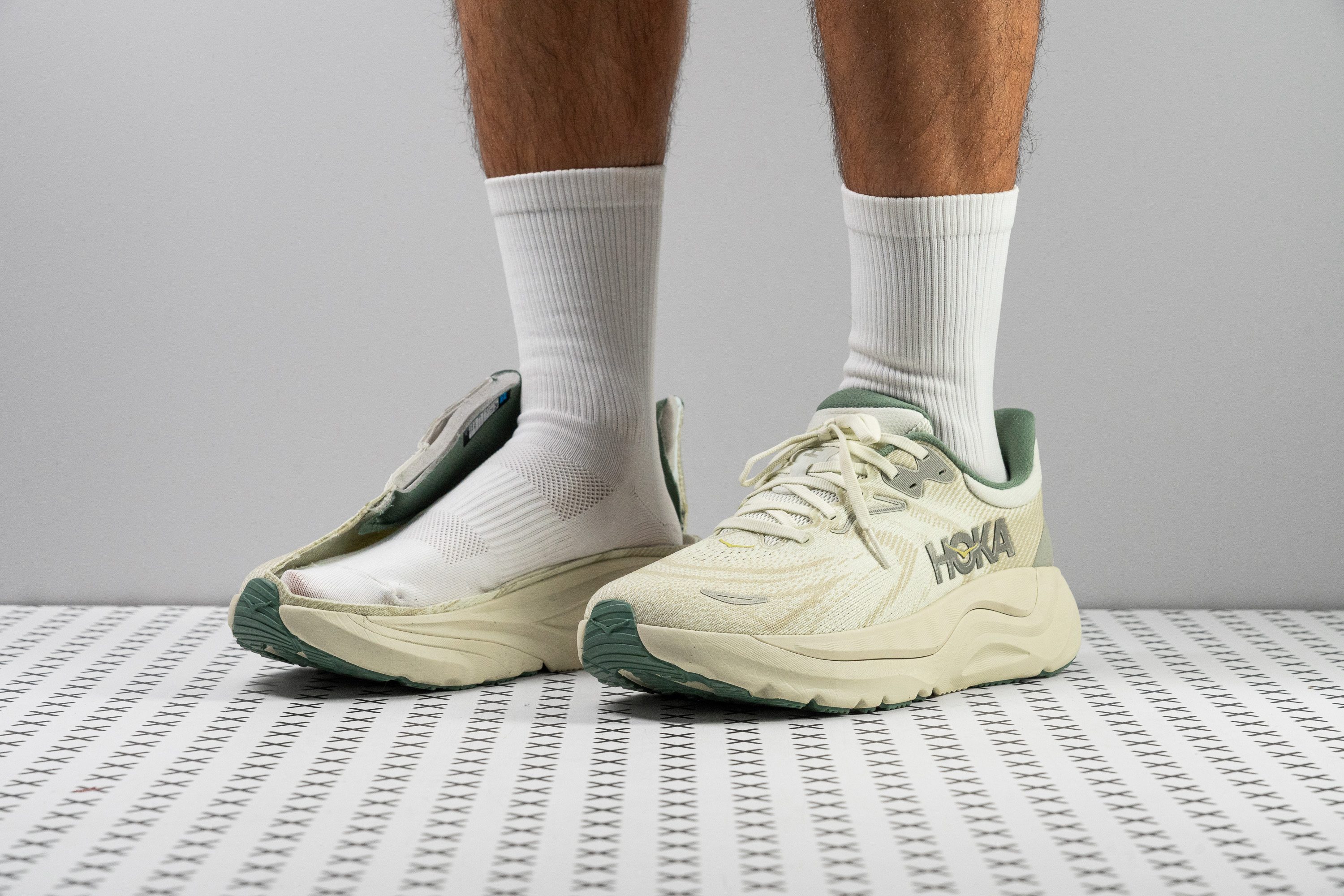











































What makes it the best?
Upon wearing HOKA Arahi 8, we were blown away by how it blends pillowy goodness and surefootedness into one lightweight shoe. Our lab reveals that its luxurious comfort comes from the cushion’s excellent impact protection, while the unwavering support comes from the H-Frame system and broad heel. It definitely tops the charts as our best stability cushioned running shoe.
Arahi 8 ensures steady strides by incorporating a wider-than-average heel measuring 96.3 mm. True enough, the fit feels forgiving, and each landing feels safe. Its H-Frame uses firmer foam for added side-to-side support despite the shoe’s height. As seen in its maximum 5/5 torsional rigidity score, the midsole has strong resistance to twisting.
True enough, our cut-in-half shoe reveals a staggering 39.4/28.1 mm height, packed with a heavenly plush foam. Our shock absorption test reveals a high 138 SA in the heel and 113 SA in the forefoot, ensuring zero ground feel for all foot strikers.
With its maximum comfort and stability, it surprisingly weighs a minimal 9.1 oz (259g). However, its thickness made it stiffer longitudinally. Runners seeking a more natural ride should try a more flexible shoe.
Pros
- Impressively lightweight for its size
- Strong shock absorption
- Wider fit than previous versions
- Outstanding durability across upper and outsole
- Early-Stage Meta Rocker smooths transitions
- Higher drop suits better heel strikers
- Comfy and plush for everyday use
- H-Frame stability system
- Comfortable heel counter
Cons
- Very poor breathability
- Grip needs to improve
- Still no supercritical foam
- Minor price bump
Best budget cushioned running shoes
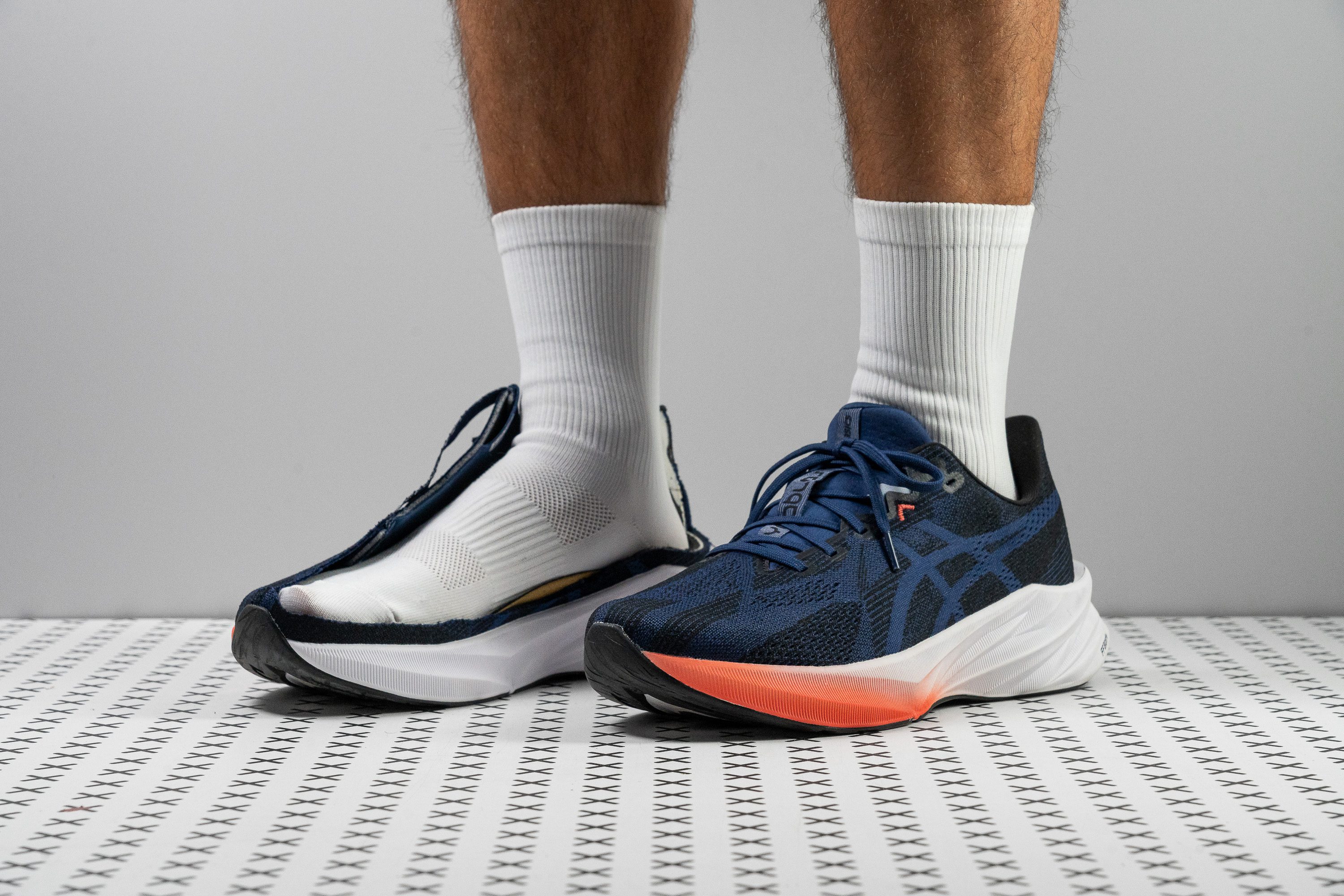












































What makes it the best?
At £120, the ASICS Dynablast 5 is surely a bang for the buck — keep in mind that the average daily trainer is priced at £130. It got impressive ratings in and out of our lab and proved itself a cushioned, durable trainer that can perform on the same level as its more expensive counterparts.
Not only is this daily workhorse light in the pocket, but it's also on our feet, too. While most cushioned and affordable trainers are heavy, Dynablast 5 weighs only 9.3 oz (264g), at par with average.
The midsole feels soft underfoot, perfect for beginners and even high-mileage runners. The shoe is impressively stacked for its weight, reaching a height of 39.4/31.8 mm. Moreover, we recorded world-class shock absorption scores of 156/127 SA, making it even more protective compared to more expensive counterparts.
Another reason why we got our money’s worth is its all-around durability. Double-digit miles barely scratched the outsole, as seen in our Dremel’s minimal 0.8 mm dent. Even the inner lining and toebox proved to be wear-resistant, cementing the Dynablast 5’s overall rugged build.
Given its focus on comfort, we found its responsiveness lacking when trying to pick up the pace. Runners seeking a dynamic ride should invest in other trainers.
Pros
- World-Class shock absorption
- Maximalist cushioning at an affordable price
- Ideal for beginners
- High durability ratings
- Exceptional value
- Stable forefoot platform
- Drop suits all footstrikes
- Breathable upper
- Can handle long runs with ease
Cons
- Moderate-to-low energy return
- Heavier than Novablast 3
- Low volume toebox
What makes shoes cushioned?
When it comes to cushioned running shoes, we focus on the midsole (cushioning). Cushioned running shoes simply have more cushioning than what we consider barefoot or minimalist running shoes. In fact, if they have more than 30mm at the heel, we consider shoes cushioned.
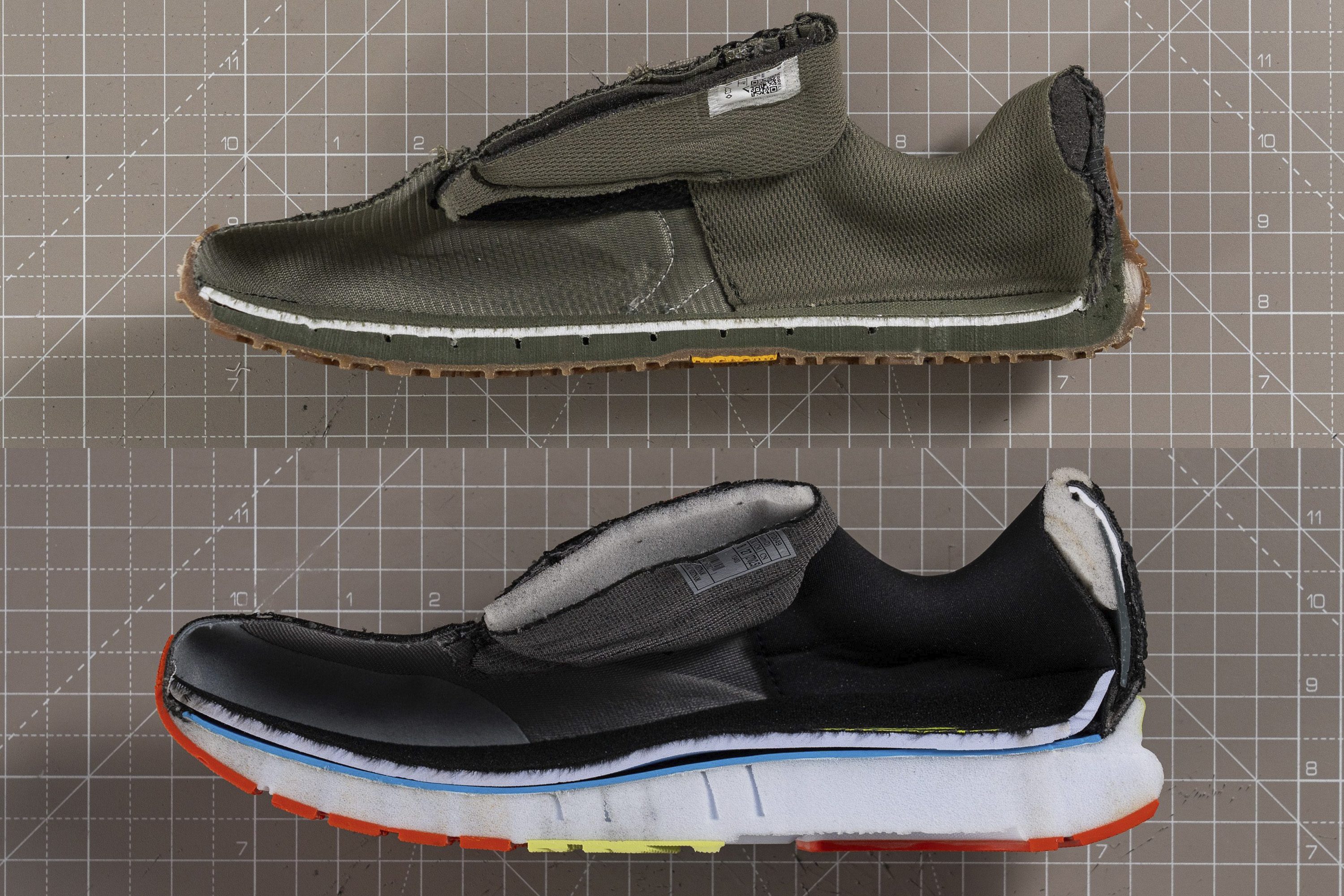
Also, more midsole below the feet means more impact protection and, depending on the amount of the midsole, it could also mean less ground feel.
Cushioned vs. plush vs. padded
Another thing to cover before we dig deep into the world of cushioned running shoes. Many runners use the terms cushioned, plush, soft, and padded interchangeably. Here’s how we work with them:
- Cushioned running shoes have a heel stack height higher than 30 mm. They can be both soft and firm.
- Soft or plush shoes can fall into different categories, both minimalist and cushioned. Softness is not related to the height of the shoe. Plush, however, is used for shoes that have a very soft and generous cushioning.
- Padded shoes have a padded tongue, a thick heel padding, or a padded heel collar. Knit upper also adds another layer to the overall padded feel. Usually, shoes that are higher off the ground are more padded, but there’s no rule, which is why padding can appear across all shoe categories.
|
Category |
Stack height |
Softness |
|
Cushioned |
> 30mm in the heel |
Any |
|
Soft |
Any |
< 33 AC |
|
Plush |
High-stacked |
Usually softer than soft (< 28 AC) |
|
Padded |
Any |
Any |
Here’s how that looks like in shoes we’ve tested.
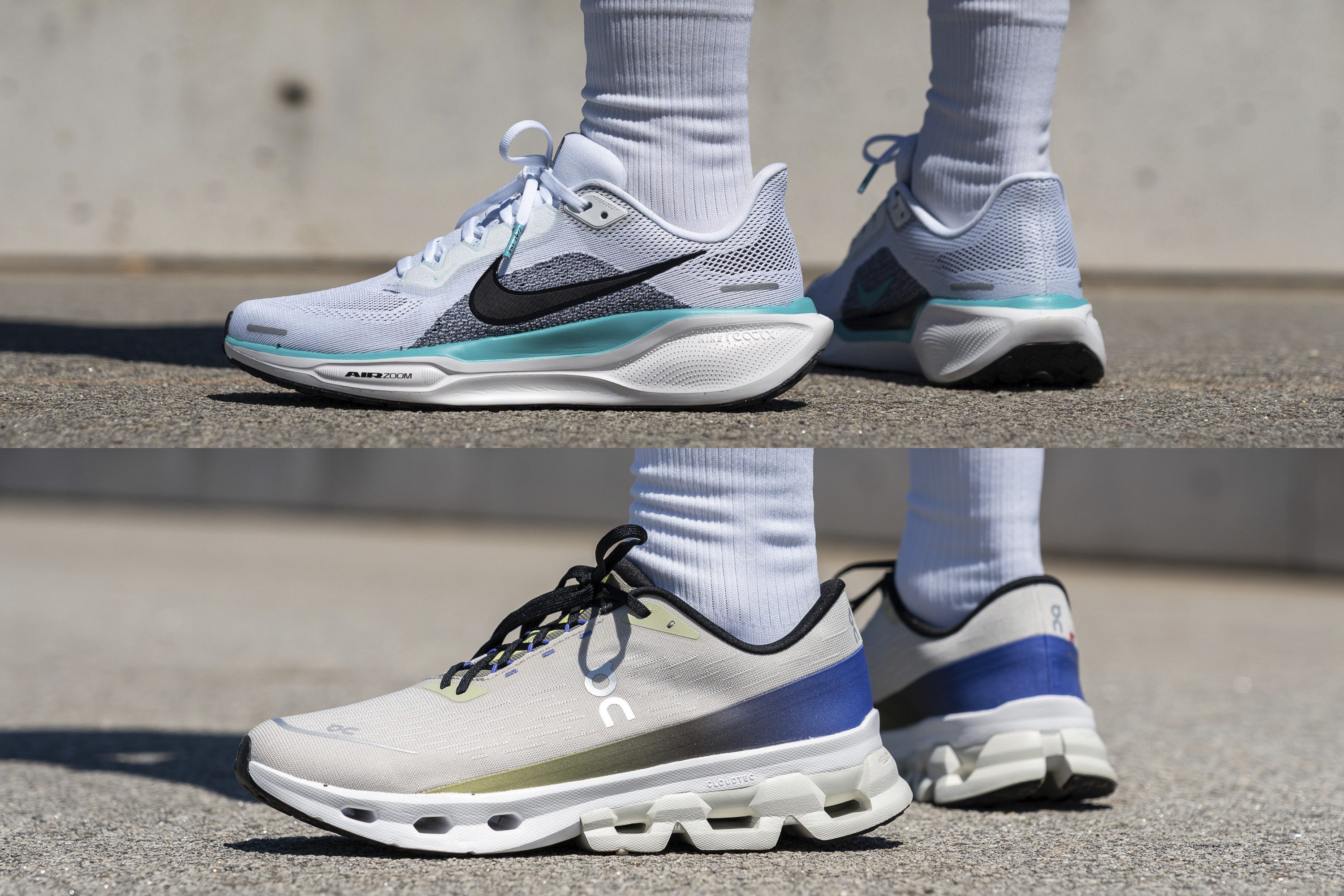
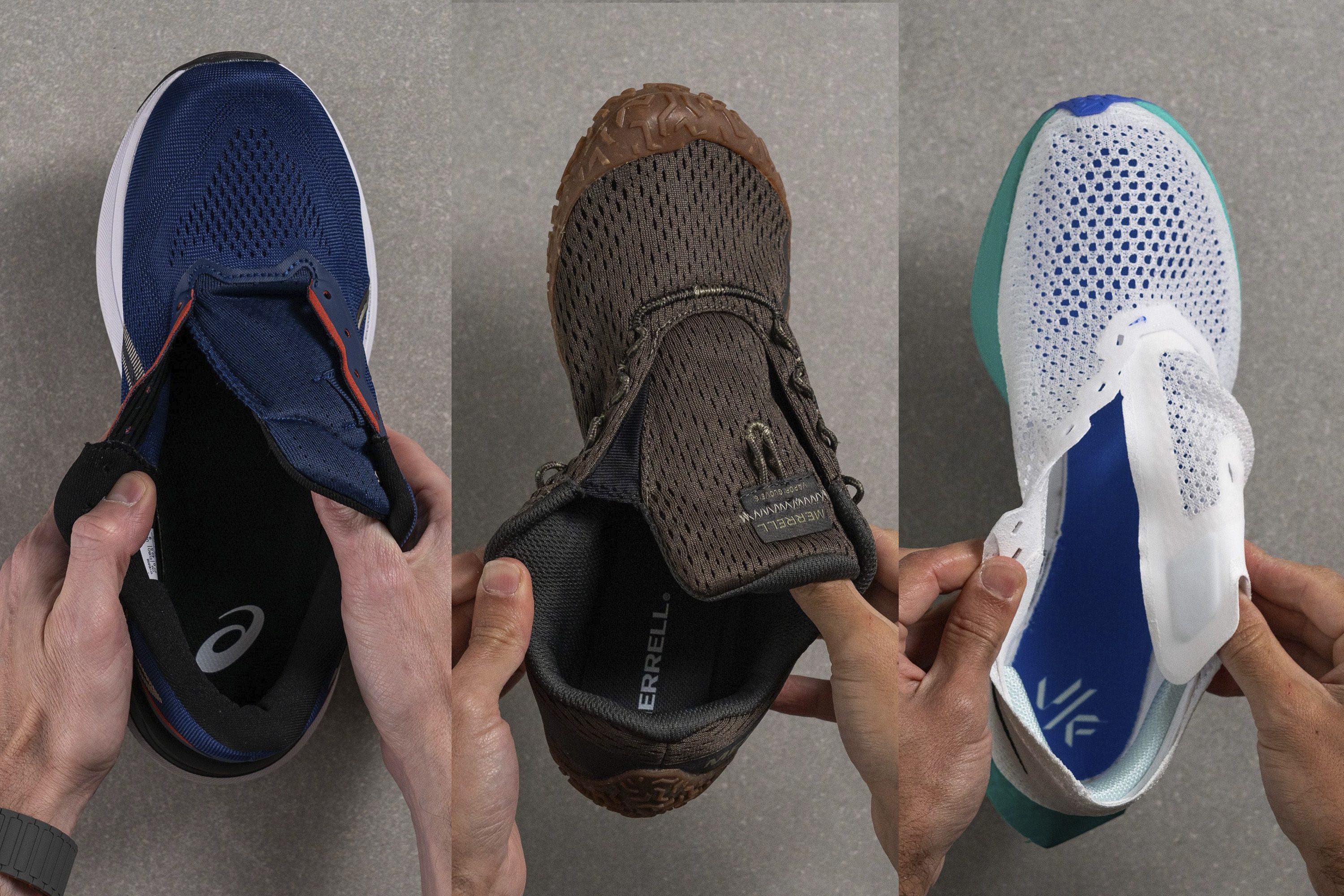
To understand the possible variations, here's how soft and high off the ground best-rated cushioned running shoes are.
6 things to pay attention to when buying cushioned running shoes
- How much foam do you actually need? Is it stable? Higher shoes mean more impact protection but, if their bases are narrow, shoes can be very unstable. Take this into account depending on what kind of runs you’re getting the shoe for.
- How responsive do you want the midsole to be? Running shoes with high energy return feel better, ride better, and offer so-called leg-saving features.
- How much shock absorption are you looking for? This feature is often confused with midsole softness, but we will clarify.
- How stiff do you want them? More flexible shoes mean there’s a more natural feel when running. But, when shoes are very high, plates are often needed to stabilise them, and such shoes are very stiff.
- What’s the climate like where you usually run? Midsole softness changes with temperature. Fortunately, we also cover this in our lab tests.
- Durability of the foam: Is it standard foam or premium foam? Often, we have responsiveness on one side and durability on the other. You can’t have both on max at the same time.
- Weight of the shoe: sometimes, more cushioning means more weight.
We will dive in into all of these features below, 1 by 1.
How much cushioning do you need?
As always, depends on your needs. Higher shoes usually offer more impact protection but they can be unstable. Shoes that are lower to the ground can offer ground feel and stability.
In our lab, we measure the stack heights according to the guidelines from WorldAthletics. Heel and forefoot stack heights are measured at 12% and 75% of the inside length, respectively.
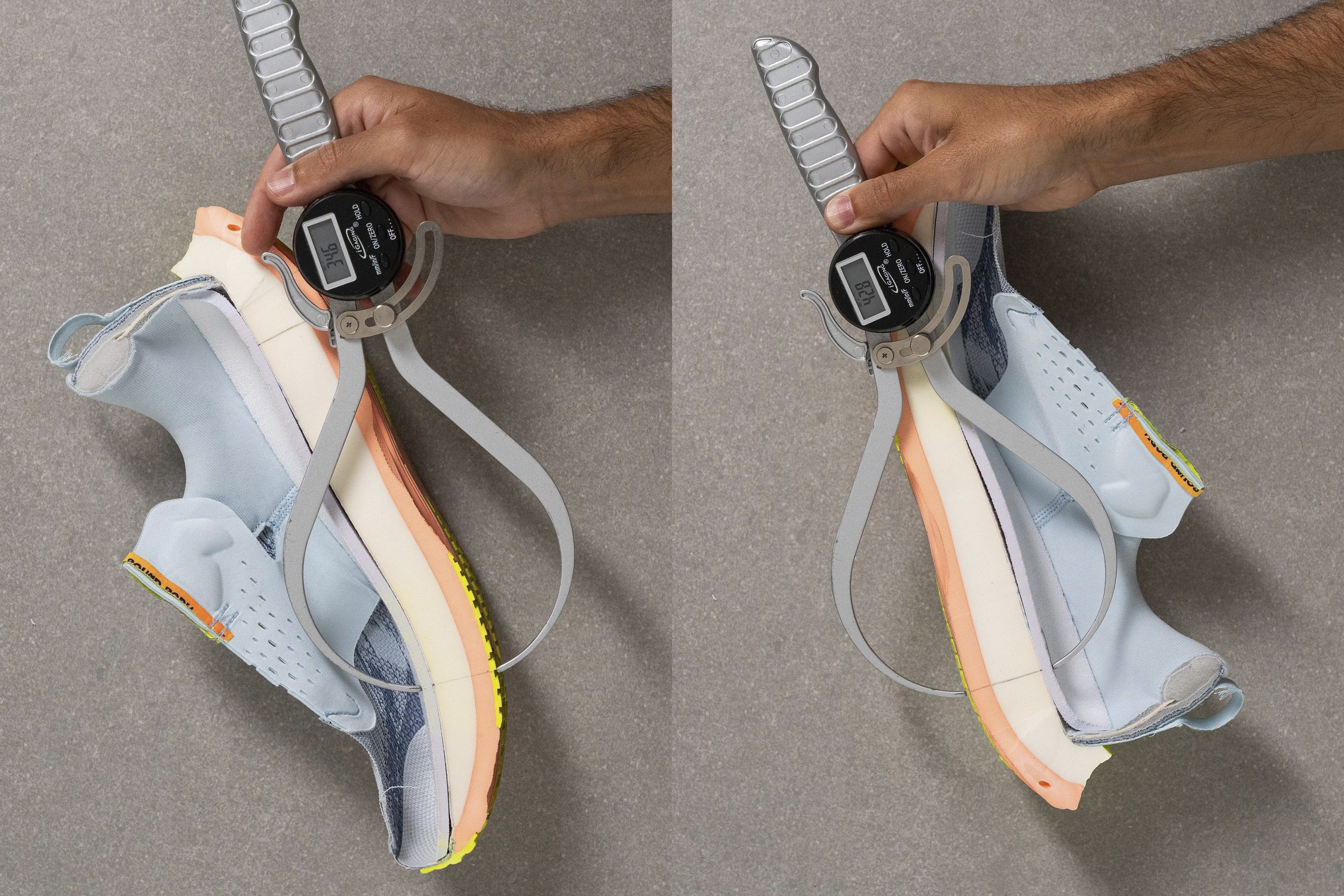
Using filters on our website, you can choose how much of the midsole you want under your heel and under your forefoot. Heel strikers need more cushioning under the heel, while midfoot and forefoot strikers focus on the cushioning at the front. If you’re not sure about your foot strike, please read Foot Strike: The Ultimate Guide.
Most often, we see shoes for forefoot strikers, and shoes for all strikes. The first difference to notice is the rubber placement on the outsole.
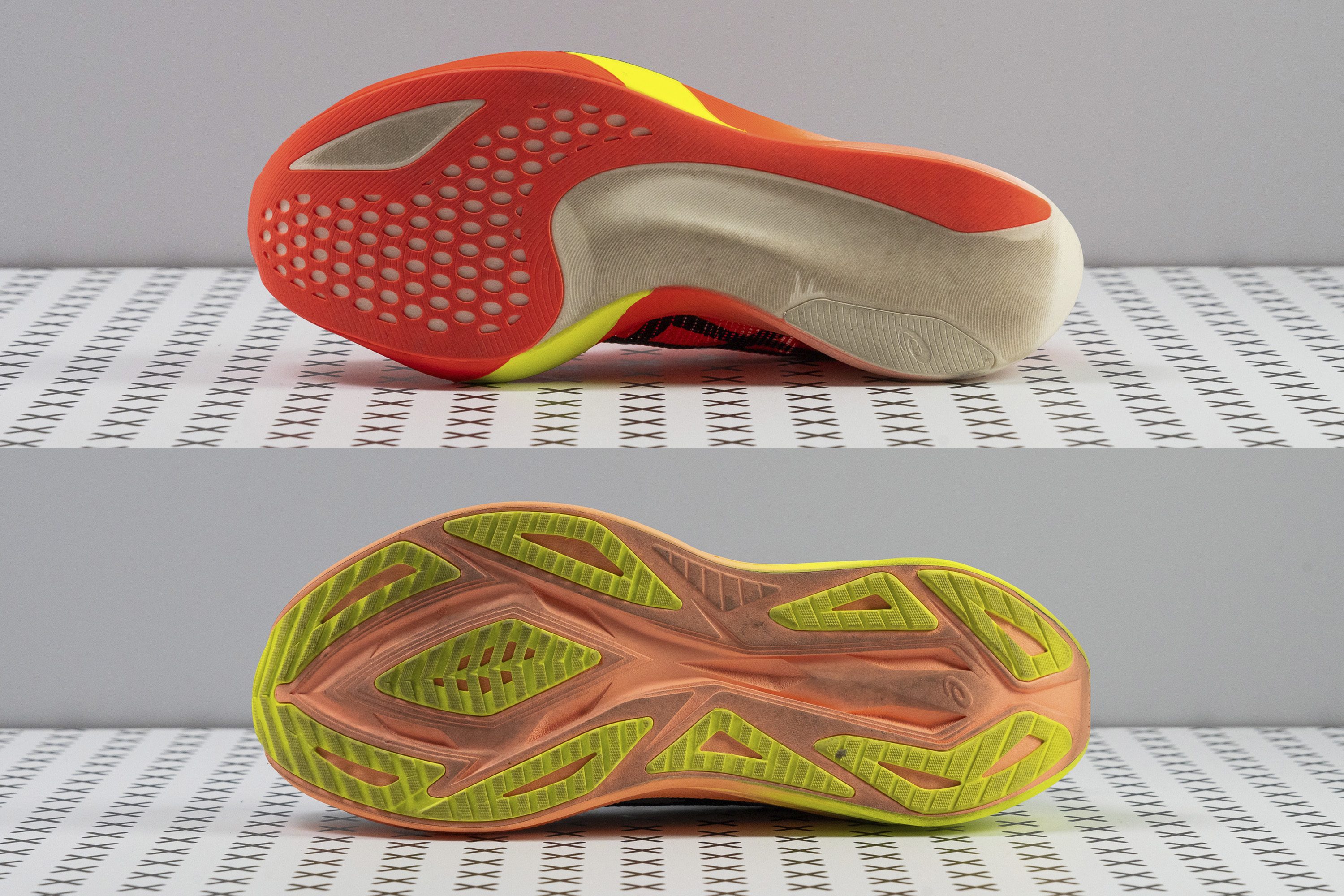
It’s also important to pay attention to the heel drop. Lower drops will utilise the muscles of your lower legs, while higher heel drops will utilise your thighs and hip muscles. Depending on your preference and previous and current injuries, it’s best to choose one where your muscles will follow.
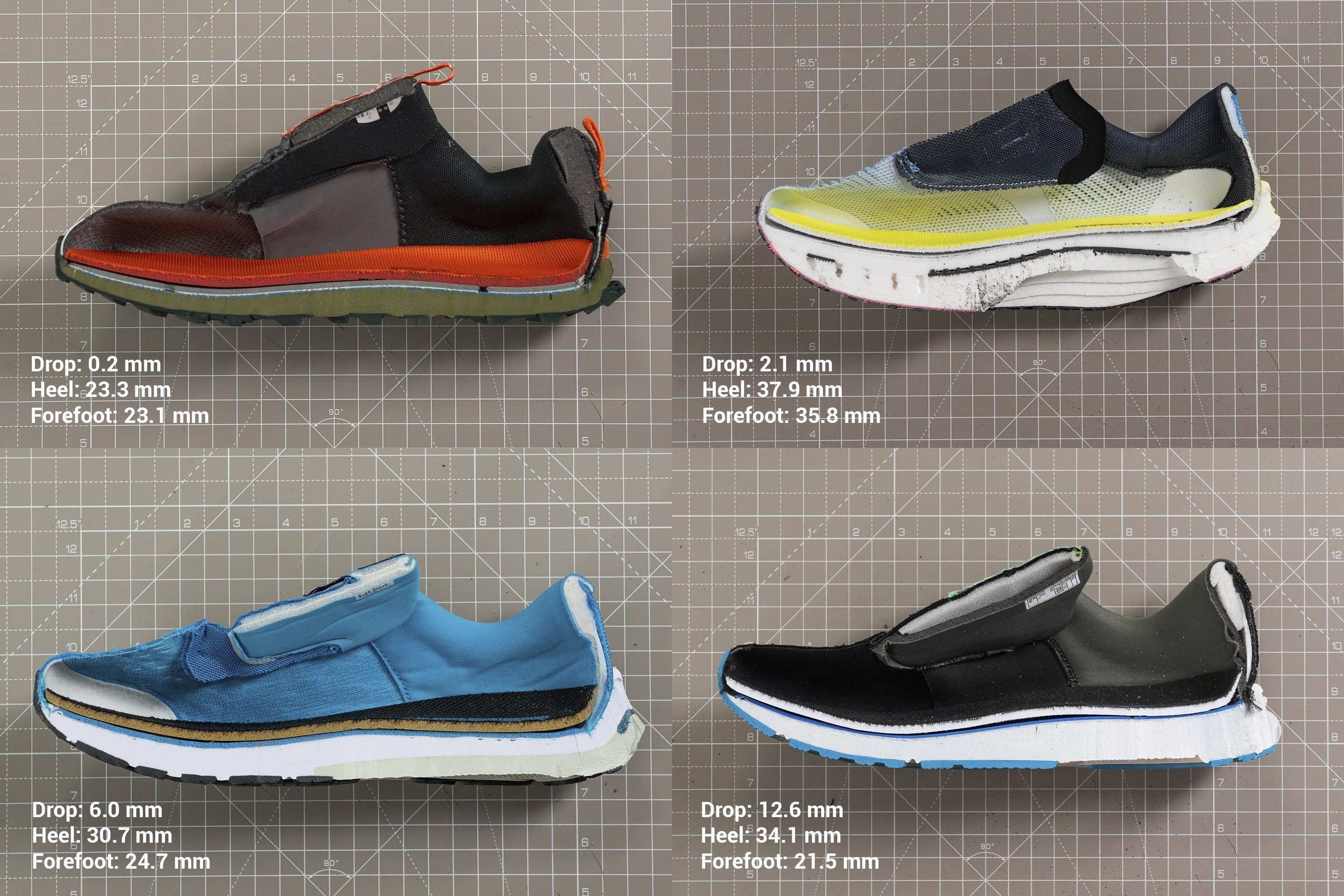
| And, if you’re more experienced, you can experiment with different heel drops for the sake of variation and strengthening different leg muscles. We wrote about this at great lengths in our Ultimate guide on heel to toe drop. |
Stability of cushioned running shoes
Many runners love the idea of running in high-stacked running shoes, and while those seem great, it can be challenging to use them for cornering, sharp turns, or slightly uneven terrain (like gravel). The wider the base, the more stable the shoe.
Here, you should look at the base:
- It can be narrow and tall, which usually means it is unstable, or
- It can be tall but wide or it can feature midsole protrusions (so called sole flares) which make it more stable
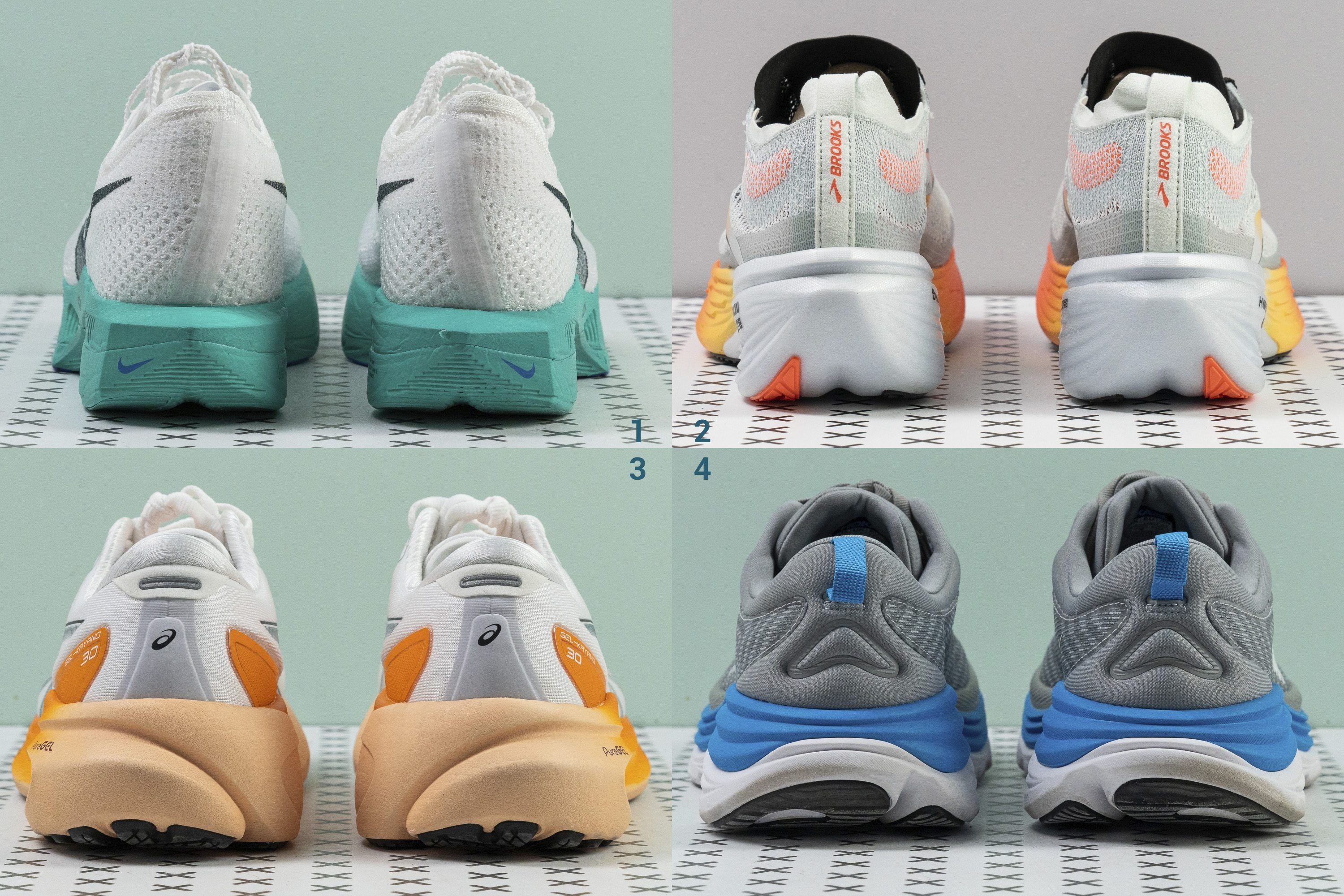
In our shoe lab, we measure the width of the base at the forefoot and at the heel. Again, if you’re a forefoot striker, focus on the toebox, and if you’re a heel striker, examine the heel area - is it narrow or wide?
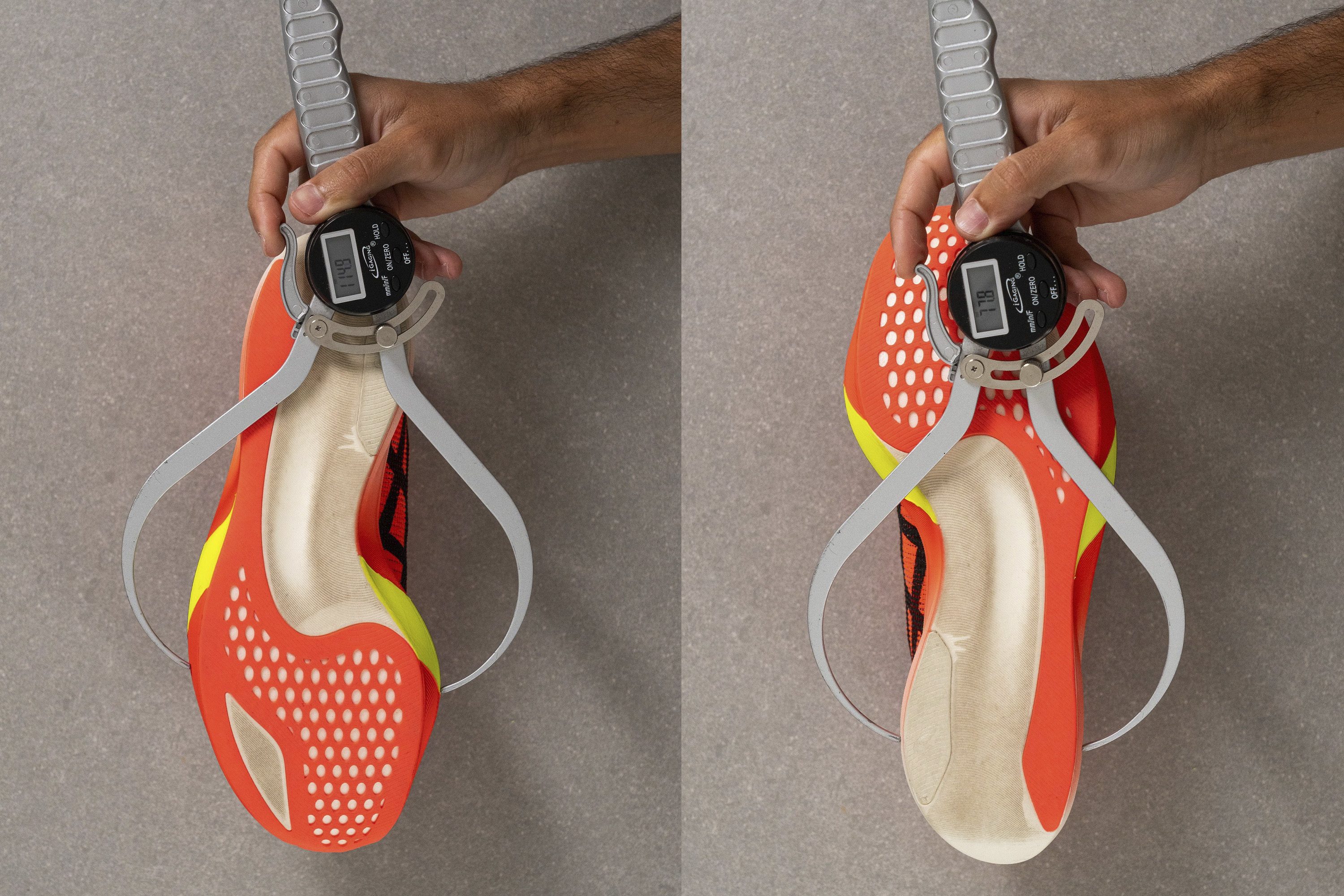
It’s important to clarify that here, we’re talking about neutral shoes that are more or less stable. In the world of cushioned shoes, we can, of course, find both neutral shoes and stability shoes.
- If you’re not sure about your pronation, please read our in-depth guide on pronation.
- In case you know you need stability shoes (due to overpronation), consider going to this guide immediately: Best stability running shoes.
Stiffness levels of cushioned running shoes
Another layer of stability is stiffness. Stiffer platforms mean there’s less wobbling and less work for the feet. But not every runner enjoys such shoes.
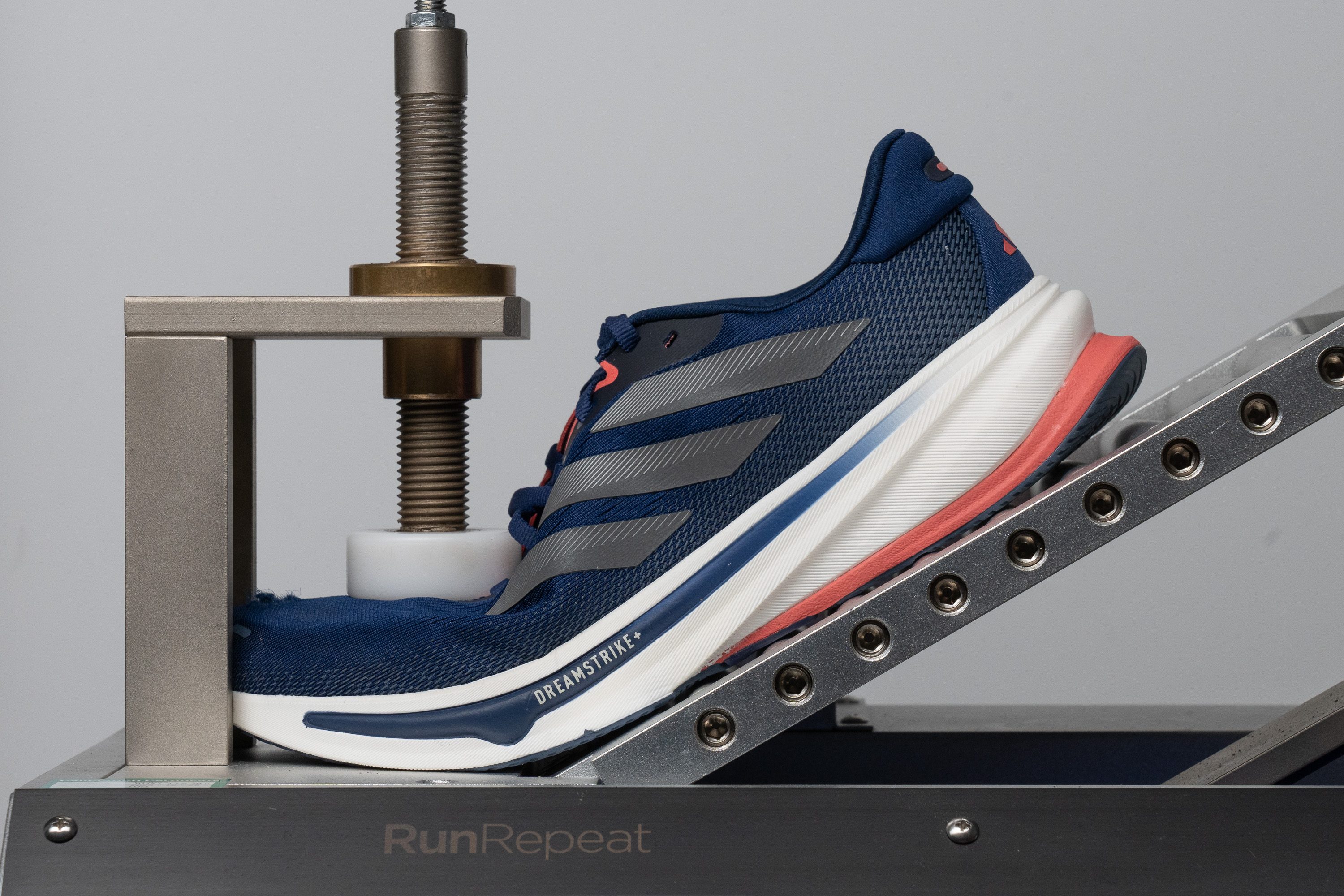
We measure this flexibility by bending the shoe to 30 degrees after locking the toebox in place and adjusting the position of the bottom plate so that it touches the heel that has lifted slightly due to a forefoot rocker. The reading tells us how stiff the shoe is: the higher the number, the stiffer the shoe (because more force was needed to bend it).
Softness and shock absorption of cushioned running shoes
Softness is THE thing runners correlate with comfort. While usually softer means better in terms of comfort, in terms of performance and stability, it’s a slightly different story. This is because soft shoes can be both highly responsive but also very dull. Or, they can have high shock absorption or a very low one.
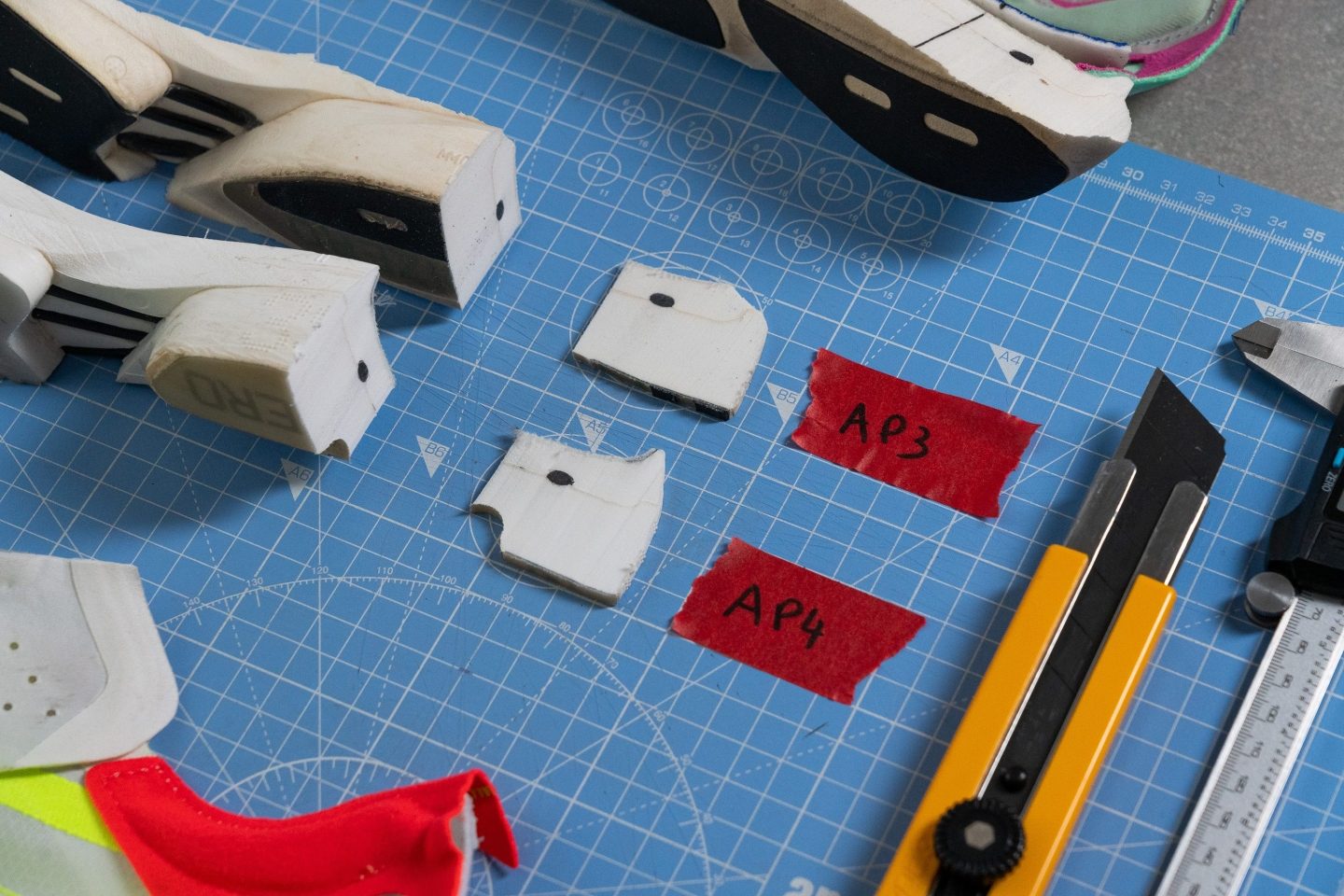
Softness is measured in our lab using a durometer. We stick the needle into the foam and note down the reading on the durometer. For this purpose, we use an Asker C durometer.
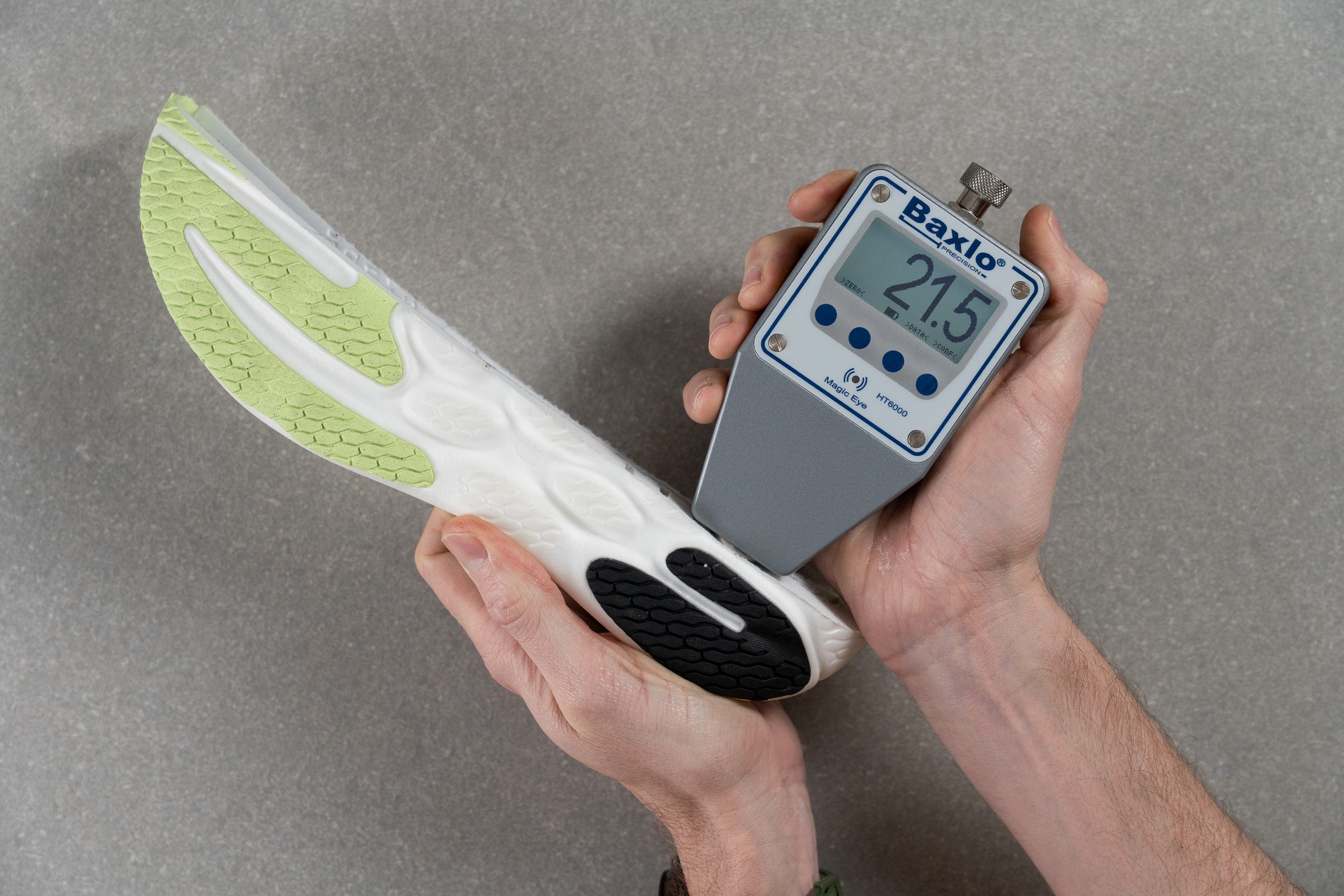
It’s important to highlight here that these measurements must be made on the shoe that was cut in half, which is what we always do. Sticking a durometer’s needle into the midsole on the outside gives wrong readings. This is because foams have protective overlays on the outside or different textures, which result in a wrong durometer reading.
On our website, you can find shoes split into 3 groups based on the durometer measurements:
- Soft midsoles: <33 AC
- Balanced midsoles: 33-42 AC
- Firm midsoles: >42 AC
However, as mentioned above, we have to take into account shock absorption. Given that it tells us how protective the midsole is, how much stress is sent to our legs will be decreased thanks to it, we think this feature is significantly more important than the softness.
The result of this test is given in SA, and the higher it is, the better. Some daily trainers may have average shock absorption, and that's ok, given that those shoes are used at slower paces and they actually prioritise durability.
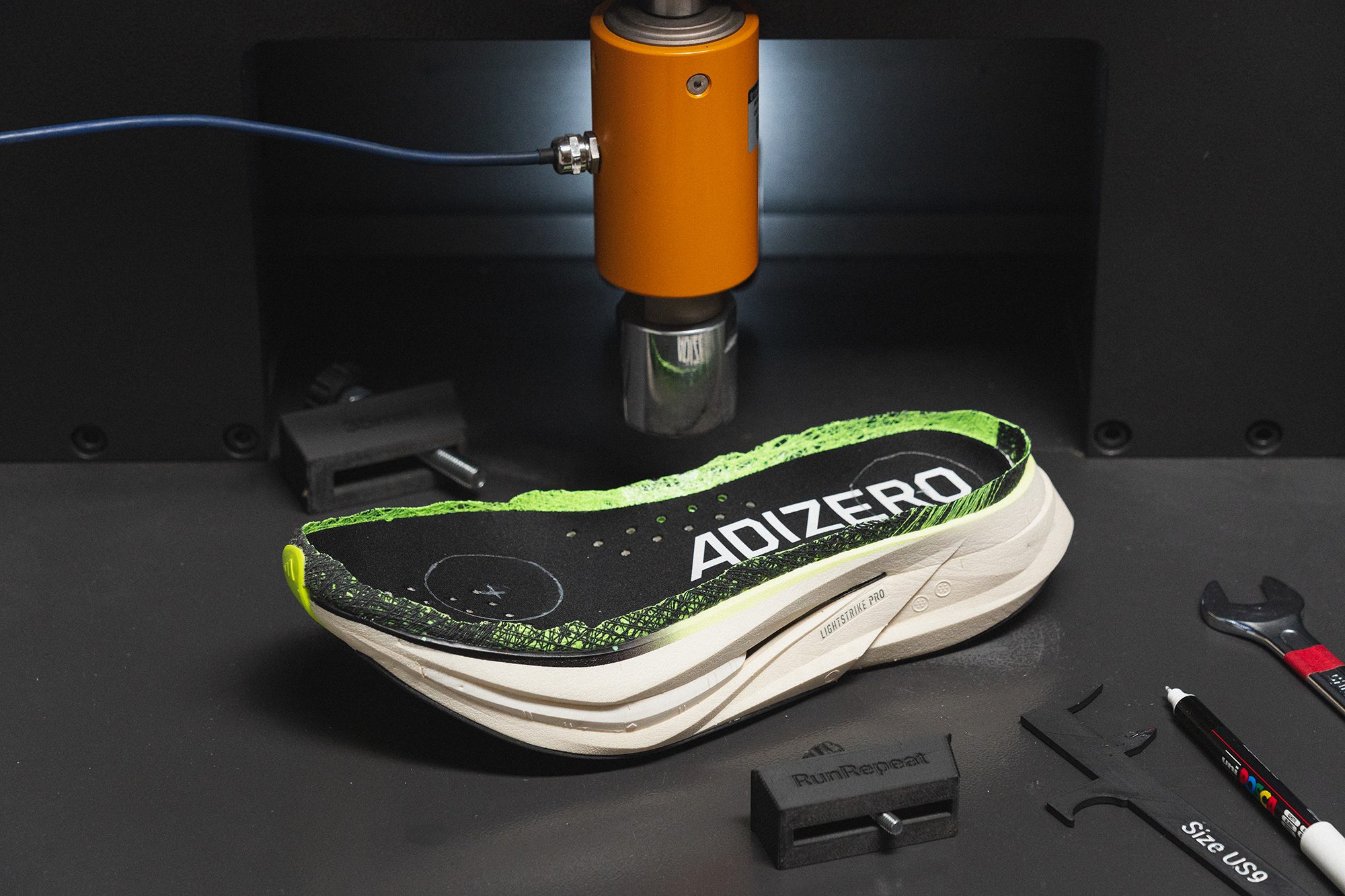
Energy return of cushioned running shoes
The highest energy return is usually found in competition running shoes. This totally makes sense as those who race want to make sure every bit counts, especially if investing in premium race shoes. They usually come with premium foams, which are known to be highly responsive (but also less durable).
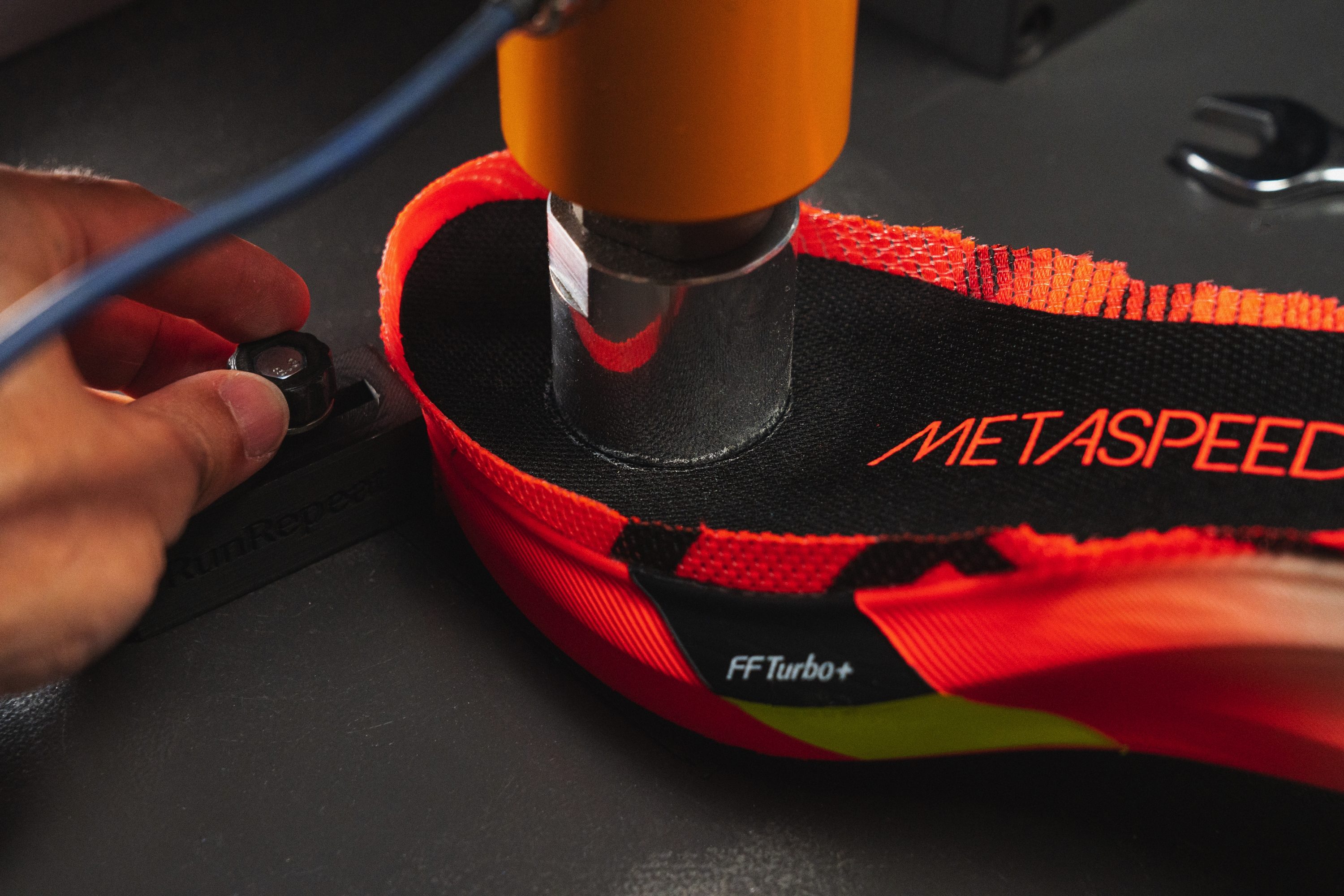
You may wonder why energy return matters so much? Well, because it tells us how good the midsole is at bouncing back after being landed on. This feature is also called responsiveness and can be felt, especially when trying a shoe with low energy return first, because it actually propels the runners forward. Energy return is only one part of the story, though, as the advantages you may get from it also depend on your foot strike, the stiffness of the shoe, your weight, and so on. We've covered this in the greatest of detail in our guide Energy return in running shoes explained.
How midsole softness and stiffness change with temperature
To present data that are valuable for all runners, whether they live in very cold or very hot climates, we introduced the freezer test. We measure the softness and flexibility of the shoe at room temperature and then freeze it for 20 minutes, only to repeat the tests afterward.
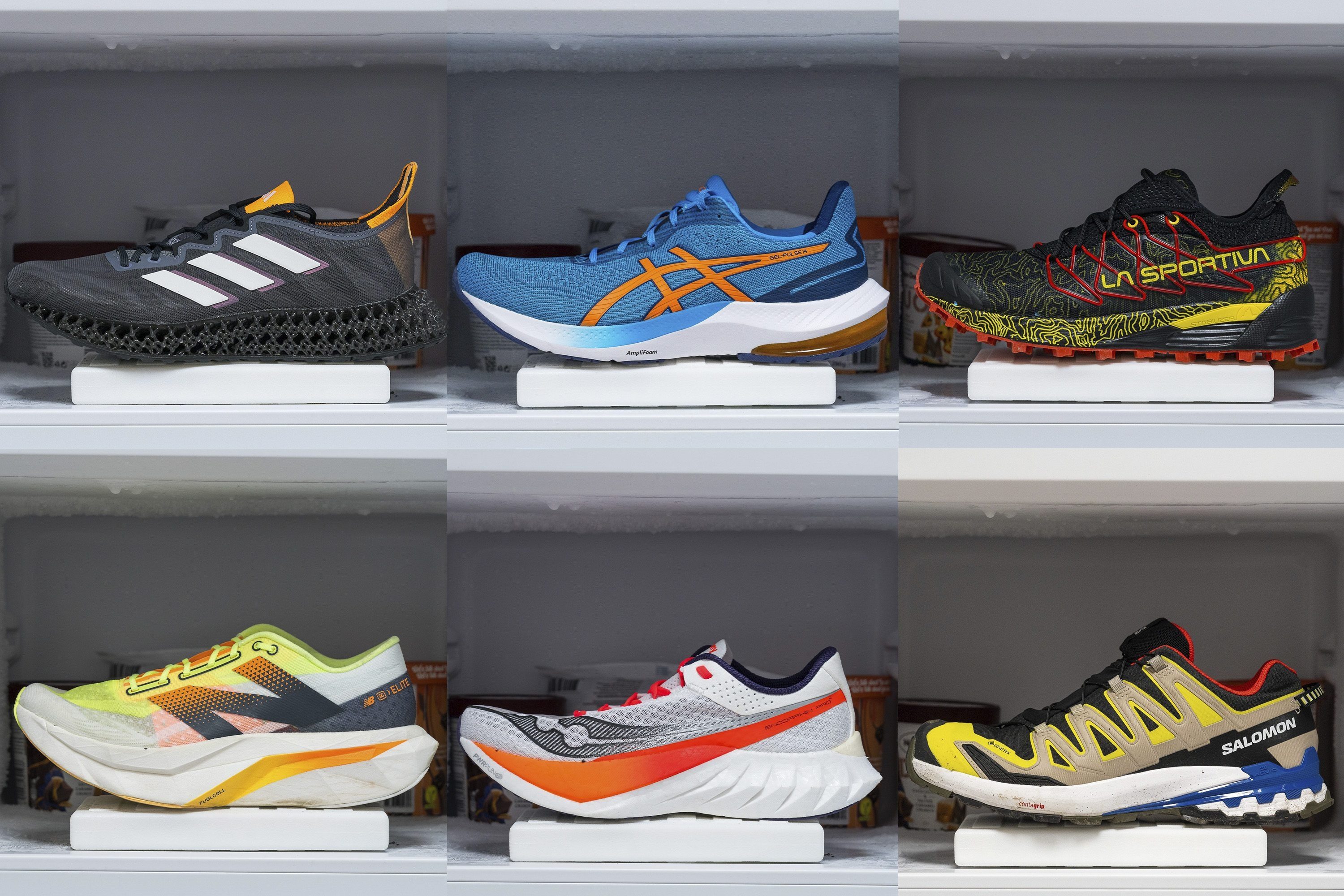
This test tells us how midsoles change in cold weather and what you can expect. The change in percentages is not enough without some context. If the shoe is VERY soft and firms up 50%, it is not the same as if the shoe was rather firm and it firms up the same 50%. We usually look at the averages at room temp and post-freezing to get the full picture.
The change in percentages, however, does tell us whether the shoe will feel significantly firmer in cold weather or not compared to what you felt at room temperature.
The same applies to flexibility. We measure it in the lab at room temperature and then repeat the test after the freezer.
Premium or standard foam?
Before we even begin talking about the types of foams and all the details, we must tell you that we already wrote The ultimate guide to running shoe foams. This is THE article to read if you’re curious about foams in running shoes!
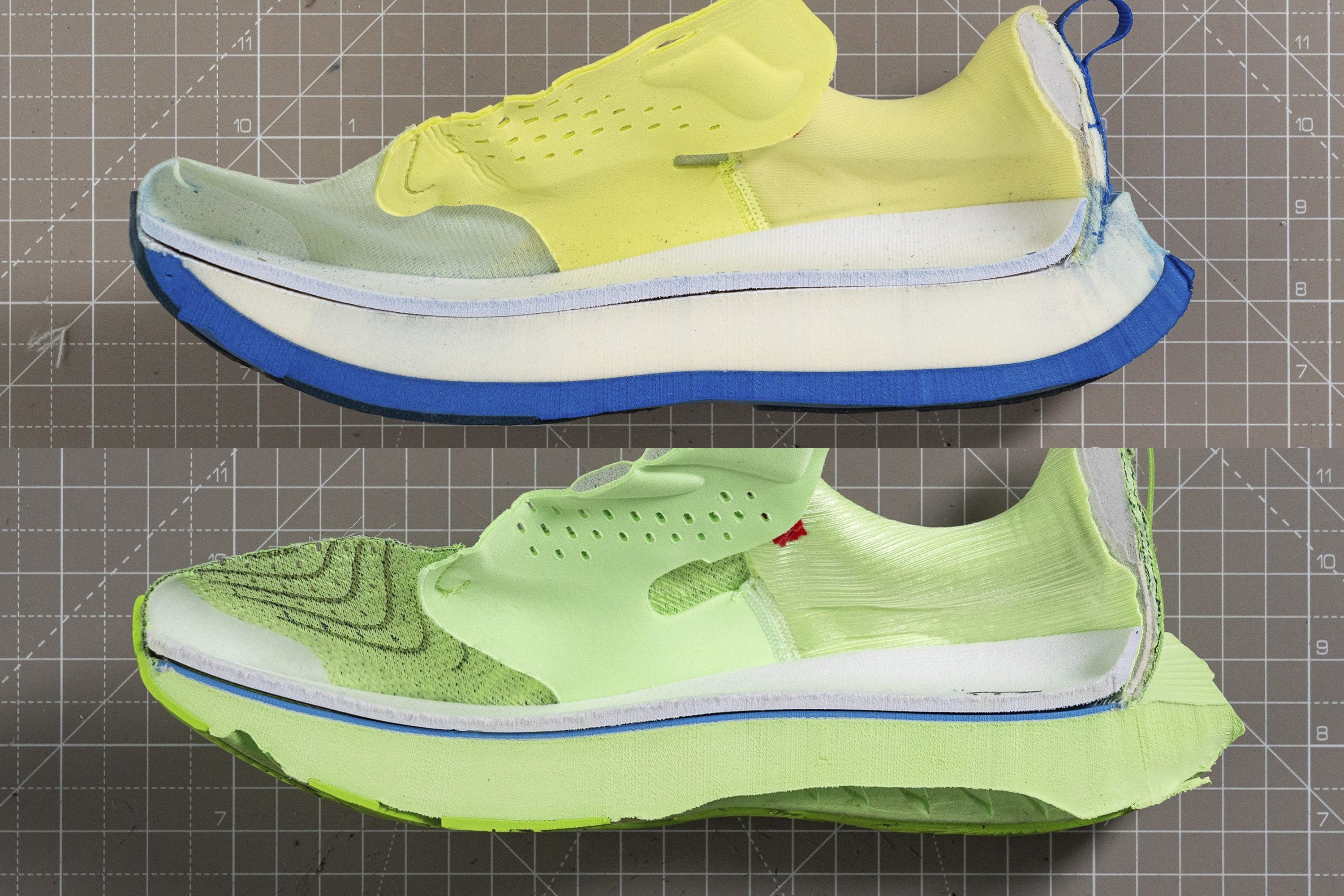
Premium foams are insanely responsive and offer a very fun ride, and runners can often cover greater mileage in them than in shoes with standard foams, thanks to the leg-saving features. These foams, however, are expensive and less durable.
|
Your priority |
Best midsole for your priorities |
Our shoe suggestion |
|
Stability and performance |
Lightstrike Pro |
|
|
A secure bet for your next PB |
ZoomX / FF Turbo+ |
|
|
A durable yet fast shoe |
Lightstrike Pro |
|
|
A balanced approach |
PWRRUN PB |
|
|
Bouncy yet firm ride for short distances |
FF Turbo |
|
|
The plushiest ride |
FuelCell |
|
|
Racing flat vibes in a premium foam |
Lightstrike Pro or FF Turbo |
|
|
Shock-absorbing ride for midfoot strikers |
Enerzy Lite+ |
|
|
A great super shoe for heel strikers |
PWRRUN HG |
Standard foams are less responsive than premium foams, but they are more durable, stable and affordable.
|
Your priority |
Best midsole for your priorities |
Our shoe suggestion |
|
Hyper-plush ride |
FuelCell |
|
|
Fun and fast ride |
Nitro |
|
|
A cold-proof midsole |
PWRRUN+ |
|
|
Stability and firmness |
Lightstrike EVA or Helion |
|
|
Durability |
Boost Light / PWRRUN+ |
|
|
Bouncy ride |
FFBlast+ / DNA Loft v3 |
|
|
A hybrid all-rounder |
React / ReactX |
|
|
Responsive feel |
ProFly+ |
|
|
Shock-absorbing, plush ride |
Fresh Foam X |
Durability of the midsole in cushioned running shoes
We don’t have a specific lab test for this (yet). However, we did write the most comprehensive guide on foams found in running shoes and there we discussed the durability of various foams.
To make things easier, here the foams whose MAIN feature or drawback is durability. There are many other foams famous for other features. To learn more about those, please read the above-mentioned guide.
Durable standard foams
- Merrell Super Rebound Compound (EVA)
- Puma Profoam / Profoam Lite (EVA)
- Salomon EnergyCell / EnergyCell+ (EVA)
Durable premium foams
- Asics FF Turbo (Nylon)
- Adidas Lightstrike Pro (TPEE)
- Puma Nitro Elite (PEBA + EVA / A-TPU)
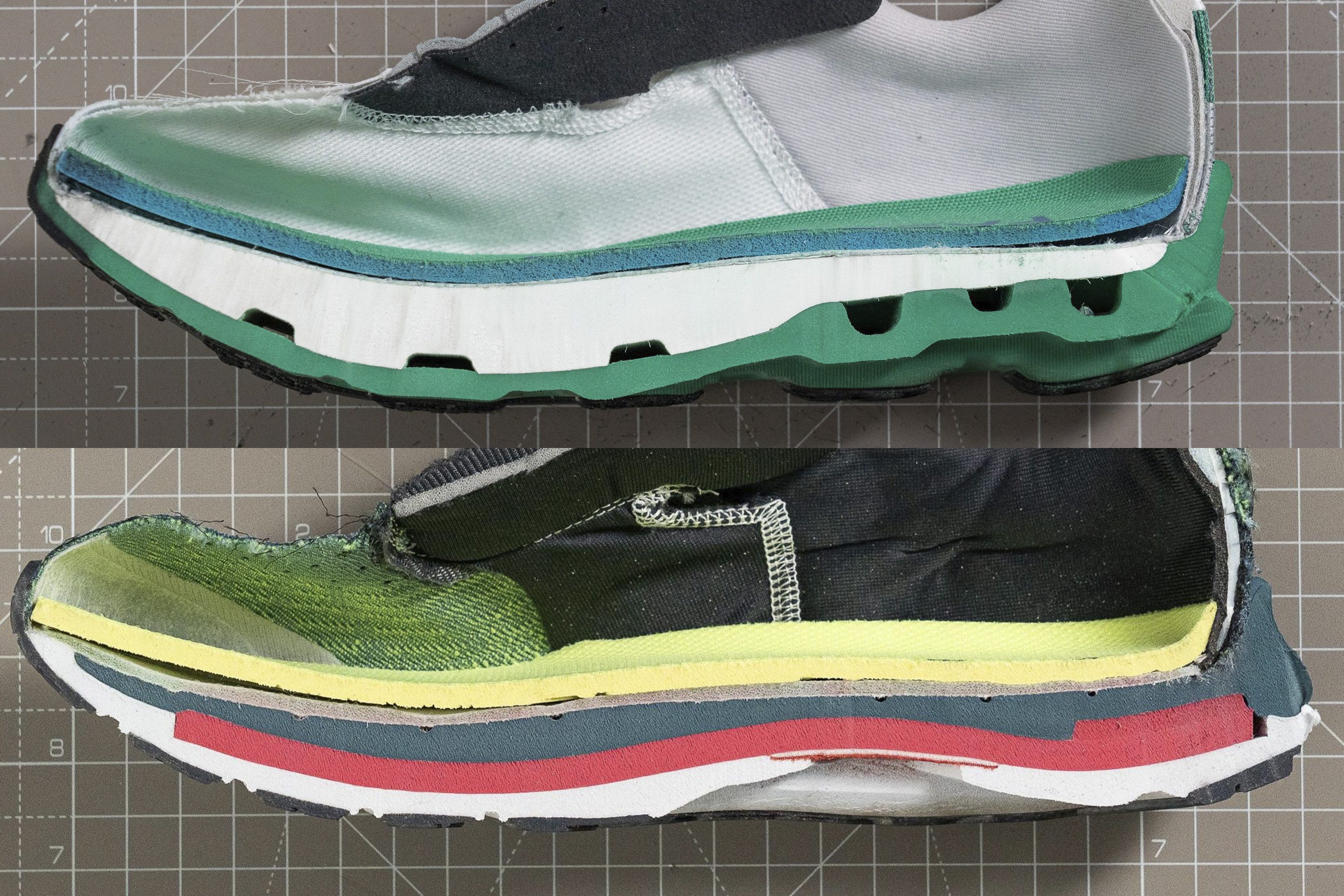
Non-durable standard foams: Asics FF Blast / FF Blast+ (EVA + OBC), Hoka ProFly+ (EVA), Puma Nitro (TPEE / PEBA), Mizuno Enerzy Core (TPE).
Non-durable premium foams: Nike ZoomX (Pebax), On Helion HF (Pebax).
Weight of cushioned running shoes
Previously, higher stack height meant more weight, because simply there are more materials present. However, with the improvements in the foams, especially premium ones, we can often encounter very high running shoes that are actually lightweight.
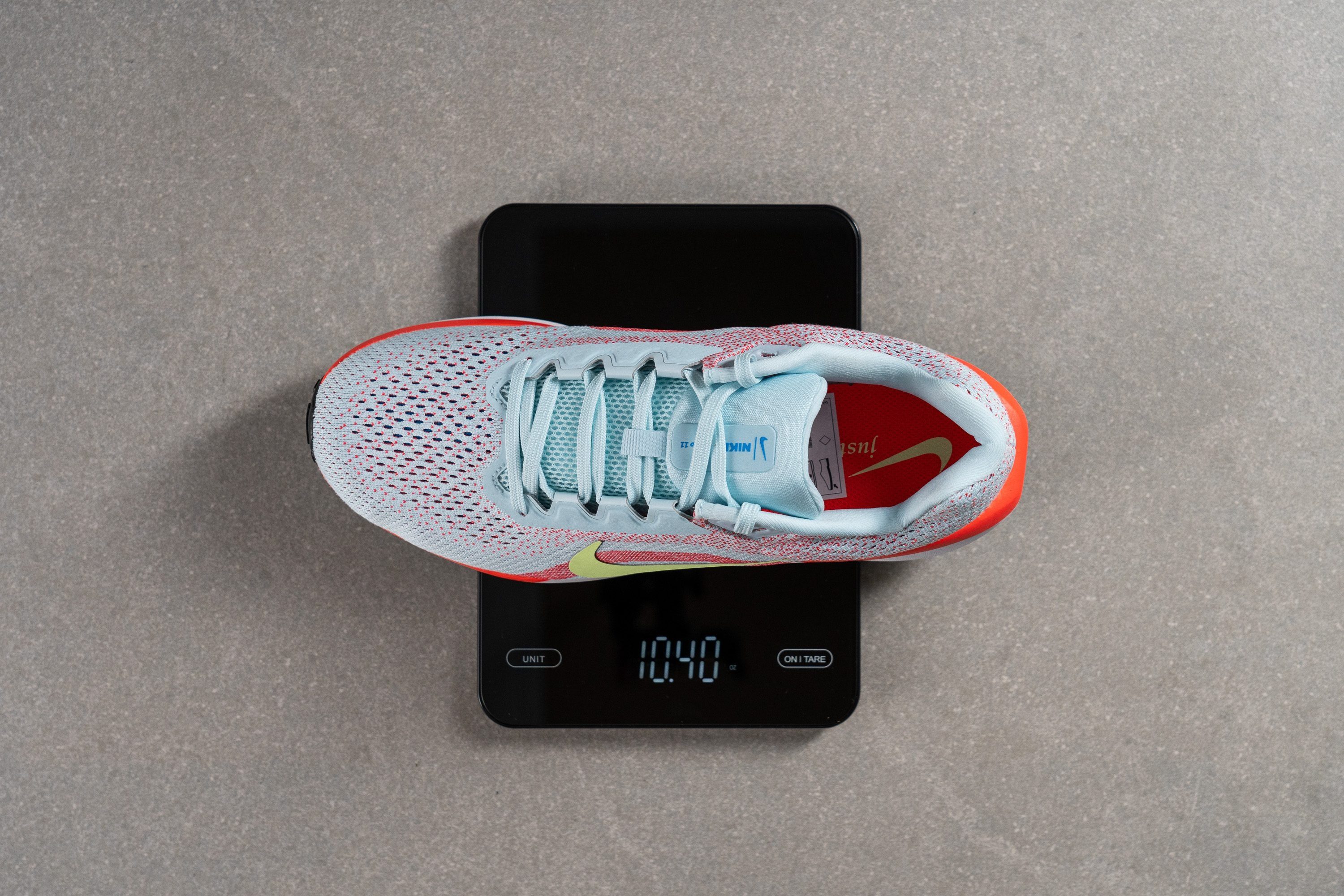
The weight, of course, depends on many things, not just the height. Stability technologies found in stability shoes make those runners heavier on average.
In case you want your cushioned shoes to be as light as possible, here’s an overview based on our lab measurements:
Role of insoles
Often overlooked, insoles play a role in the overall comfort and cushioned feel. The role is rather big given that runners often get the feeling that a shoe is way softer than it actually is, only thanks to the insole.
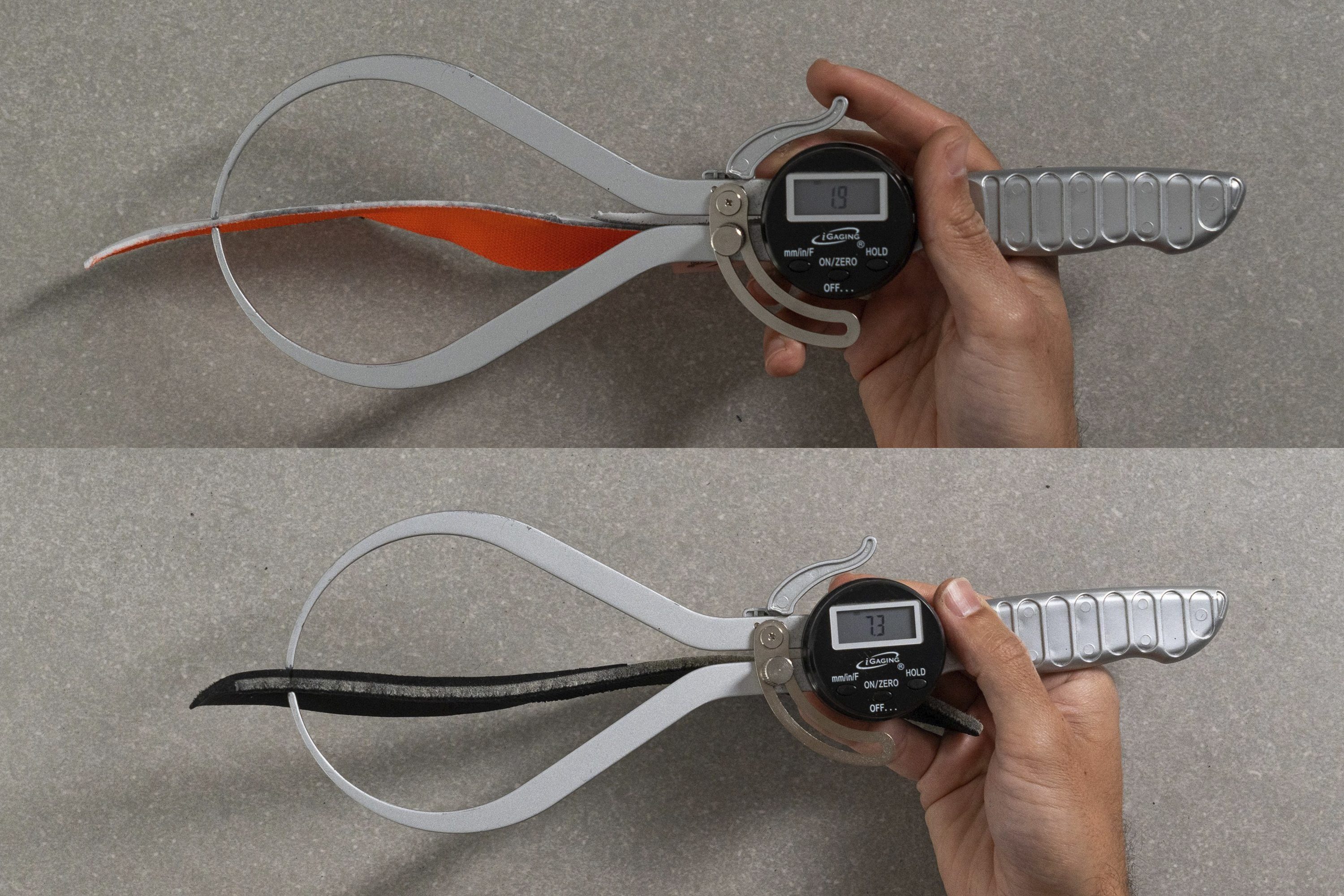
We always measure the thickness of the midsole in our lab and note down if there are any special features to it. Of course, you can, at any time, swap the insole for your favourite custom one, but in case you don’t, you’ll at least know what to expect in the new shoe you’re getting.
Finding cushioned running shoes for winter
If you’re looking for a cushioned winter running shoe, you can utilise our lab tests to the fullest and take into account:
- The change in softness in cold weather: look for smaller changes
- The change in stiffness in cold weather: look for smaller changes
- Breathability: less breathable shoes are warmer
- If the shoe has waterproof materials (in case you need them).
Depending on your preferences, you can easily use our filters to find the shoe that matches your criteria. And if you want to learn much more about how shoe features change with temperature, read our in-depth guide Effects of temperature on running shoes.
